ESG REPORT 2024
Environmental and Social Governance
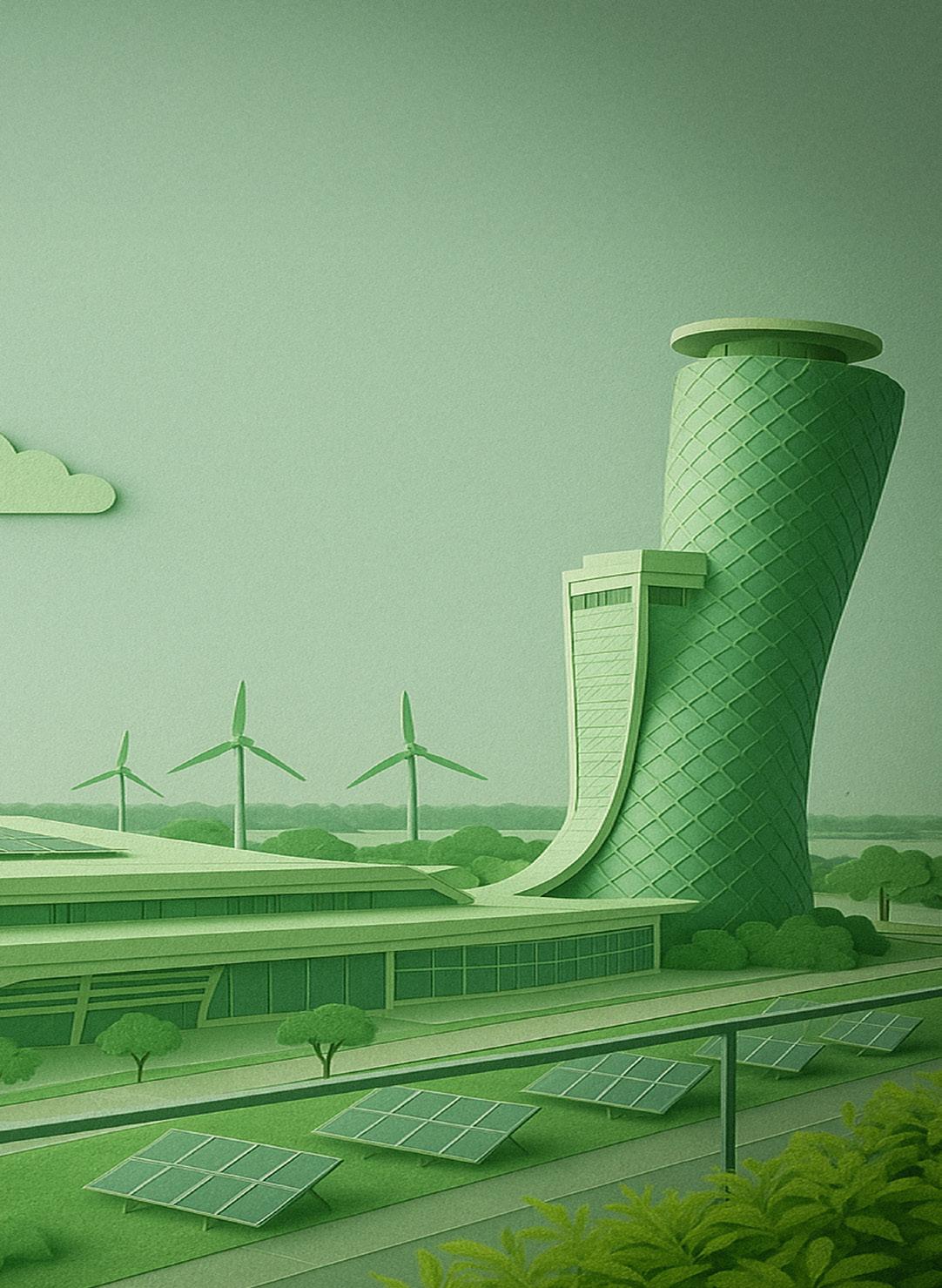
ESG Pledge
“Create long-term value for all our stakeholders through consciously ethical and sustainable practices across our group activities”




ESG Pledge
“Create long-term value for all our stakeholders through consciously ethical and sustainable practices across our group activities”


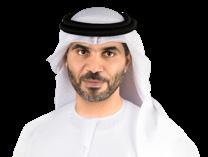
ADNEC Group’s sustainability journey in 2024 has been remarkable, demonstrating our commitment to responsible growth. Building on our formal pledge to achieve Net Zero emissions by 2045, I’m proud to announce that we have developed a comprehensive Net Zero Transition Plan to turn this ambition into reality. Our vision is clear, to lead by example in our industry and align with the UAE’s bold sustainability agenda, while moving even faster toward Net Zero carbon emissions.
To this end, we took significant steps in 2024 to reduce our carbon footprint and champion clean energy. ADNEC Group signed a landmark clean energy agreement with Emirates Water and Electricity Company, enabling our flagship venue, ADNEC Centre Abu Dhabi, to become the first exhibition venue in the MENA region fully powered by clean energy, thereby effectively eliminating the venue’s electricityrelated carbon emissions. We have also commenced work on a 5 MWp rooftop solar photovoltaic system, further expanding our on-site renewable energy capabilities, which will meet approximately thirty percent of our electricity demand. These efforts were proudly recognised when ADNEC Group won the prestigious Sheikh Hamdan Bin Zayed Environmental Award for the first time, a testament to our team’s dedication and leadership in environmental stewardship.
Our commitment to ESG goes beyond environmental initiatives. In 2024, we formally embedded ESG criteria into ADNEC Group’s procurement process. This marks the start of a journey toward more responsible and transparent sourcing. By integrating sustainability and ethical considerations into our purchasing decisions, we are engaging our suppliers as partners in our mission to create long-term value, positive impact and reduce our scope 3 emissions.
Equally important are the social and economic contributions we deliver to our community. Over the past year, ADNEC Group’s activities supported more than 62,000 jobs across the UAE. We also contributed AED 8.57 billion in Gross Value Added (GVA) to the Abu Dhabi economy, underlining our role as a key driver of inclusive growth and prosperity. These outcomes reinforce our belief that business success goes together with community wellbeing and national development.
None of these achievements would have been possible without the unwavering support of our wise leadership, our shareholders and partners, and the hard work of our exceptional team. As we look ahead, we remain committed to raising the bar in sustainability and innovation, continuing to support the UAE’s vision for a greener, more resilient future. Together, we will build on this strong foundation and carry our momentum forward, ensuring that ADNEC Group continues to create lasting positive impact for years to come.
Humaid Matar Al Dhaheri Managing Director & Group CEO, ADNEC Group
2.5%
Reduction in Carbon Intensity vs 2023 (tCO2e / employee)
Reduction in tCO2e emissions by Excel London vs 2023
15% vs 2023
37% vs 2022
Reduction in electricity consumed per event
ADNEC Venues Cluster
of waste is recycled or diverted from landfills by ADNEC Centre Abu Dhabi 7% vs 2023
Reduction in electricity consumed per event
ADNEC Centre Abu Dhabi
Reduction in water
per event vs 2023
vs 2023
vs 2022
Reduction in water consumption per visitor vs 2023
Clean Energy powers
ADNEC Centre Abu Dhabi
of waste is recycled or diverted from landfills by ADNEC Group
of ADNEC Centre
Abu Dhabi and twofour54 are ISO14001 certified
25%
Increase in total number of Employees (FTEs) vs 2023
0
100% of suppliers are compliant with ADNEC Group’s Conflict of Interest Policy 51%
Legal cases raised by employees
49% increase vs 2023 20,016
62,138
Employee volunteering hours
Jobs Supported within UAE
21% increase vs 2023
Increase in % of females in senior management roles (Director & above) vs 2023
15.8%
Increase in Economic Impact (GVA - UAE) vs 2023
100% 100% 100% of business clusters analysed for risks related to money laundering and/or the financing of terrorism
Workforce has formally certified its compliance with the anti-competitive (conflict of interest) policy of ADNEC Group companies are ISO 27001 certified
0
Reported or legal actions on anti-competitive practices, harassment, discrimination, and/or abusive behaviours
100%
Compliance with UAE Information Assurance (IA) Regulation by ADNEC Group
0
Reported instances of corruption or nonmonetary sanctions
This ESG report covers ADNEC Group’s key business clusters from January to December 2024, focusing on material topics most relevant to our stakeholders. It demonstrates ADNEC Group’s commitment to responsible growth, transparency, and accountability across all ESG areas.
Our reporting aligns with the Global Reporting Initiative (GRI), and the UN Sustainable Development Goals (UN SDGs). It also reflects UAE national strategies, including the UAE Net Zero by 2050 Strategic Initiative, Abu Dhabi Economic Vision 2030, Abu Dhabi Environment Vision 2030, and the Net Zero Carbon Events framework.
This report supports informed decision-making by transparently tracking performance, engaging stakeholders effectively, and aligning ADNEC Group’s ESG approach with international frameworks and national priorities. It demonstrates ADNEC Group’s commitment to data transparency, strategic coherence, and rigorous compliance with the GRI Standards, ISO standards, industry best practices, and applicable local legislation.
• Due to ADNEC Group's acquisition by Modon Holding and the subsequent asset transfer, our carbon footprint baseline will be updated from 2022 to 2024. The reported emissions data may undergo further amendments upon finalisation of the re-baselining exercise.
• Board of Directors metrics have been removed due to the organisational restructure under Modon Holding, rendering these metrics no longer applicable.
All ESG reports published from 2025 onwards will undergo external assurance by a certified third-party assurance provider.
We welcome your feedback and inquiries on this report. Please reach out to our ESG & Sustainability Team.
Khaleej Al Arabi Street P.O. Box 5546, Abu Dhabi, UAE +971 (0) 2 444 6900 strategy.sustainability@adnec.ae
to 305-3
to 305-3
2022A - The reported carbon emission metrics have been re-baselined to exclude ADNEC Hotels, covering Scope 1, Scope 2, and all relevant Scope 3 emission categories, including Purchased Goods and Services, Capital Goods, Fuel- and Energy-Related Activities, Upstream Transportation and Distribution, Waste, Business Travel, Employee Commuting, Upstream Leased Assets, and Investments.
2023B - The reported carbon emission metric has been re-baselined, excluding ADNEC Hotels, and includes Scope 1, Scope 2, and only the core elements of Scope 3 emission categories.
2024C - Due to ADNEC Group's acquisition by Modon Holding and the subsequent asset transfer, our carbon footprint baseline will be updated from 2022 to 2024. The reported emissions data may undergo further amendments upon finalisation of the rebaselining exercise.
* Water management metrics have been expanded to cover all business clusters within ADNEC Group and will be reported from 2024 onwards.
302-1
302-1
Consumption (KWh) –ADNEC Centre Abu Dhabi
*Electricity Consumption (KWh) – ADNEC Centre Abu Dhabi, ADNEC Centre Al Ain & Excel London
Per Event (KWh / Event) –
*Electricity Consumption Per Event (KWh / Event) – ADNEC Centre Abu Dhabi, ADNEC Centre Al Ain & Excel London
*Energy consumption metrics for ADNEC Venues (across the entire business cluster) have been introduced and will be reported from 2024 onwards.
* Waste management metrics have been expanded to cover all business clusters within ADNEC Group and will be reported from 2024 onwards.
*Complaints identified as genuine (severity level medium or higher) are classified in accordance with the Customer Suggestions and Complaints Approach Matrix.
Of Suppliers Have Formally Certified Their Compliance with The Conflict-ofInterest Policy
*Supplier metrics have been expanded to cover all business clusters
*Introduction of Linkedin Learning Platform **Training Programmes include behavioural, technical,
and sessions
*Figures include white-collar employees only
**L1: Managing Director & Group CEO
**L2: C-Level Suite – Direct Reports to Managing Director & Group CEO **L3: Direct Reports to C-Level Suite and/or Managing Director & Group CEO
Anti-Money Laundering, and Combating the Financing of
Prevention of Human Rights Violations
Incidents of Discrimination Reported (#)
Incidents of Abusive Behaviour Reported (#)
Incidents of Harassments Reported (#)
Audit and Internal Control
205-2 Percentage of Completion of "Conflict of Interest Declarations" By ADNEC Group Employees (%)
*Key Governance Documents: (DOA, Governance Approach, Risk Management Approach, Code of Conduct, Whistle Blowing Policy, Fraud Control Policy, Business Continuity Approach, Project Management Approach, etc) Privacy and Data Security
Group
UAE Information Assurance (IA) Regulation Compliance (%)
Promotion of Social & Economic Development

ADNEC Group, part of Modon Holding, is renowned for its rich legacy and diverse business operations, stands as a formidable force in global business and leisure tourism. The Group is a leader in managing and developing international strategic assets and contributes to the sustainable growth of Abu Dhabi’s economy.
ADNEC Group’s diverse business clusters span Venues, Events, Hotels, F&B, Services, Tourism and Media. The Group operates the ADNEC Centre Abu Dhabi, the largest event venue in the MENA region, ADNEC Centre Al Ain, the Business Design Centre and Excel London in the United Kingdom.
The Business Design Centre (BDC) in London is a multi-purpose events venue featuring an on-site community of over 100 showrooms and offices. Acquired by ADNEC Group in 2024, BDC is a strategically significant addition to the Group’s portfolio, enhancing its international footprint and embodying a purpose-driven ethos that closely aligns with ADNEC’s ESG vision.
Capital Events, the events management arm of ADNEC Group, is the leading organiser of some of the world’s most iconic events across strategic industry sectors including Defence and Security, Maritime Lifestyle, Media, Food & Beverage and Technology. Through its growing portfolio, Capital Events plays a crucial role in supporting Abu Dhabi to achieve its growth objectives as a global hub for business and leisure tourism.
ADNEC Group’s Services cluster includes its subsidiary Capital 360 Event Experiences that provides distinguished event experiences to its clients and stakeholders. The Group also launched Capital Protocol in 2023 that provides a specialised VIP protocol service which is operated by its Service cluster.
ADNEC Group F&B cluster consists of Capital Catering and Royal Catering Services, which caters to numerous sectors including aviation, healthcare, defence and education.
Additionally, ADNEC Group extended its portfolio with the acquisition of twofour54, forming ADNEC Media, a driving force in Abu Dhabi’s sustainable media and entertainment industry.
Recognised internationally for its commitment to excellence, innovation, and sustainability, ADNEC Group has garnered numerous awards, solidifying its status as a leader in the industry.
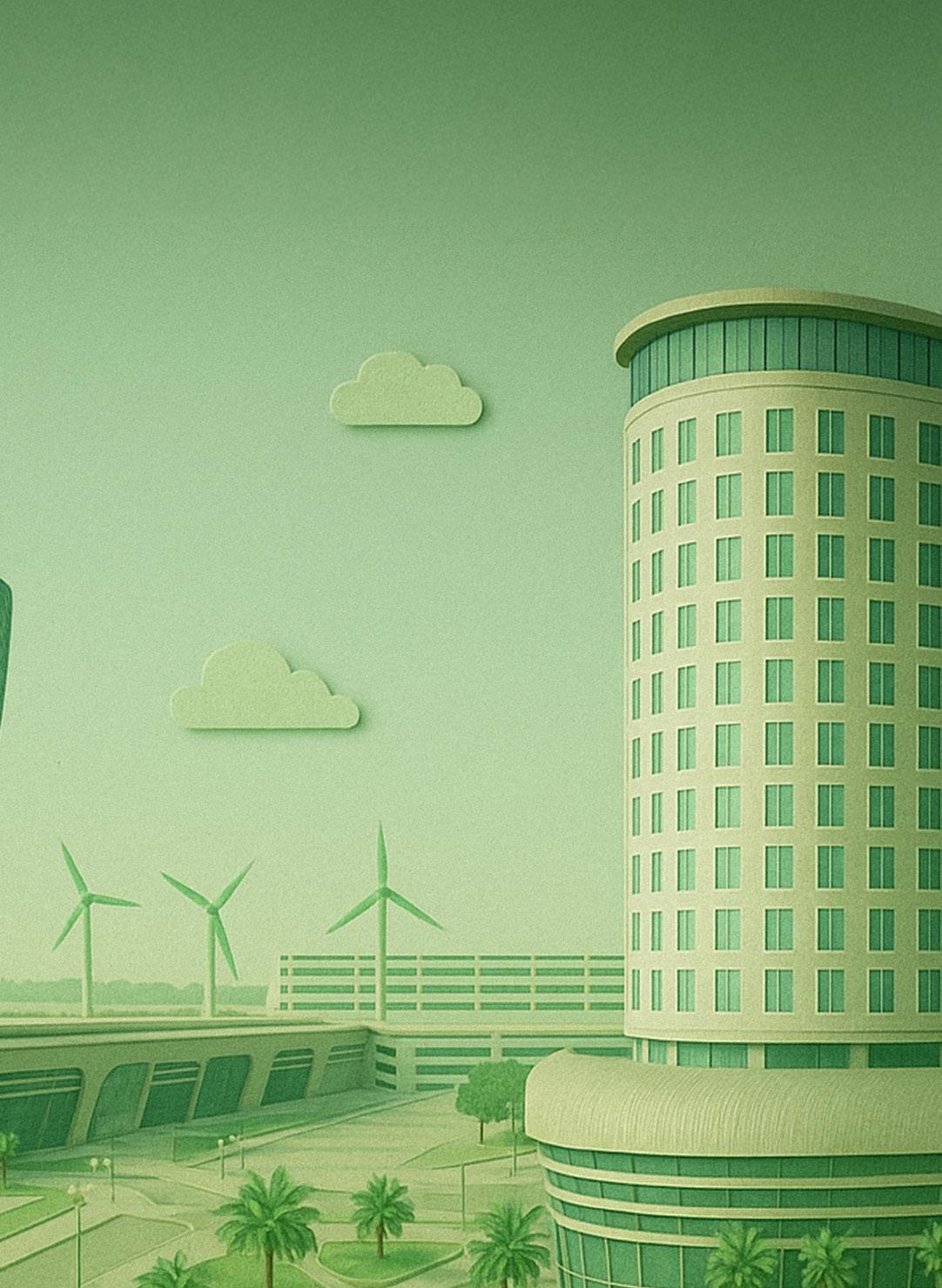









ADNEC Group's strategy is anchored in an integrated framework designed to drive long-term value creation, market leadership, and sustainable impact across all business clusters. This framework is guided by four strategic goals.
Goal 1 Financial
Sustain financial growth across our business lines
Goal 2 Commercial Grow a sustainable business
Goal 3 Sustainability Act as a responsible organisation
Goal 4 Operational Excellence
Manage and optimise assets and resources
Our Vision
A leading international group that aims for substantial and sustainable business growth.
Our Mission
We bring business and leisure travellers together to create memorable experiences. We invest to optimise asset returns.
As a global player with strong local roots, ADNEC Group aligns its sustainability strategy with leading national and international frameworks, reinforcing our commitment to long-term value creation and responsible governance. These frameworks guide our ESGrelated decision-making, support UAE national priorities, and ensure adherence to global best practices.
Sector Scope Title Overview
United Nations Sustainable Development Goals
International
United Nations Global Compact (UNGC)
Global Reporting Index (GRI)
UAE Principles of the 50
Green Agenda 2030
A universal framework comprising 17 goals adopted by all UN member states to end poverty, protect the planet, and ensure prosperity for all by 2030
A voluntary initiative based on ten principles covering human rights, labour standards, environmental protection, and anti-corruption practices.
An internationally recognised framework that provides a standardised approach to sustainability reporting, enhancing transparency, comparability, and stakeholder engagement.
Ten strategic principles guiding the UAE’s long-term economic, political, and social development, emphasising sustainability, human capital, and global partnerships.
A UAE-wide action plan aimed at accelerating the transition to a green economy through sustainable economic growth, environmental stewardship, and increased competitiveness.
General
National
UAE Net Zero 2050
Abu Dhabi Climate Change Strategy
UAE Energy Strategy 2050
We the UAE 2031
Abu Dhabi Economic Vision 2030
Abu Dhabi Environment Vision 2030
In-Country Value (ICV) Program
A national commitment to achieving netzero carbon emissions by 2050, promoting sustainable development, clean energy, and lowcarbon economic diversification.
A strategic framework aimed at reducing Abu Dhabi’s greenhouse gas emissions and enhancing resilience to climate change through comprehensive mitigation and adaptation initiatives.
A national strategic roadmap focused on diversifying the UAE’s energy sources, enhancing energy efficiency, and increasing the share of renewable and clean energy to ensure sustainable economic growth.
A comprehensive national vision outlining strategic objectives and initiatives to position the UAE as a global leader in innovation, sustainable development, economic prosperity, and societal well-being by 2031
A long-term strategic plan designed to diversify Abu Dhabi’s economy, reducing reliance on oil by developing high-value, knowledge-driven sectors and promoting sustainable economic growth and competitiveness.
A long-term strategic plan integrating economic growth with environmental sustainability, focusing on resource efficiency, biodiversity conservation, and quality of life improvements in Abu Dhabi.
A UAE national initiative designed to stimulate local economic development, enhance competitiveness, and promote local content, employment, and investments within supply chains.
Sector Scope Title Overview
General National
Sector Related International
National
Modon Holding ESG Policy & Strategy
Net Zero Carbon Events (NZCE)
Science Based Targets Initiative (SBTi)
ADNEC Group Corporate Strategy
ADNEC Group ESG Strategy and Framework
Modon Holding’s ESG governance framework, guiding and embedding environmental, social, and governance principles across all subsidiaries, including ADNEC Group.
An events industry-led initiative committed to halving greenhouse gas emissions by 2030 and achieving net zero emissions by 2050, aligned with the Paris Agreement targets.
An initiative that guides companies in setting scientifically aligned, measurable greenhouse gas emission reduction targets to effectively address climate change.
ADNEC Group’s corporate strategy, defining ambitions and targets for sustainable growth, stakeholder value creation, and integrated ESG management across its investments and operations.
ADNEC Group’s ESG-specific strategy outlining clear sustainability objectives, targets, and governance processes that guide responsible operations across all business clusters.
At ADNEC Group, meaningful stakeholder engagement is central to our ability to generate long-term value and successfully deliver on our ESG commitments. The Stakeholder Wheel below illustrates the diverse ecosystem within which we operate, highlighting both the breadth and depth of relationships across our value chain. Stakeholders positioned closer to the centre indicate a higher level of engagement, essential for achieving collaborative, responsible, and sustainable outcomes.
Proximity to the center of wheel indicates intensity of required engagement.
w MICE Industry Associations
w London Metropolitan Police Service
w NCEMA
w Abu Dhabi Police
w Abu Dhabi Civil Defense
w SEHA
w Sponsors
w London Fire Brigade
w Logistics
w Hotels Operators
w Tadweer
w Employees
w Local Community Associations and NGOs
w Local Community
w Vendors
w Service Providers
w Contractors
w Subcontractors
w Consultants
w Ministry of Defense
w ETIHAD Aviation Group
w Greater London Authority
w Department of Municipalities and Transport (DMT)
w Ministry of Industry and Advanced Technology
w UK Government
w Department of Culture and Tourism
w Modon Holding (shareholder)
w Organisers
w Abu Dhabi DED
w Transport for London
w Emirates Water and Electricity Company
w Emirates Nuclear Energy Company
w Etihad, Air Arabia & Wizz Air
w Delegates
w PCOs
w Venue Visitors
w Conference Associations
w Exhibitors
w Corporate F&B clients
w Leisure travellers
w Office Tenants
Strategic Partners: National and international entities that guide or influence policy-making, strategic direction, and sector alignment.
Operational Partners: Organisations supporting safety, logistics, and the delivery of exceptional, high-quality experiences.
Customers: Event organisers, venue visitors, tenants, and clients at the core of our service delivery.
Suppliers: Vendors, service providers, contractors, and consultants who contribute to driving operational excellence.
Society: Local communities, NGOs, and civic organisations with whom we actively engage and impact through our activities.
Employees: Our workforce, essential to performance, organisational culture, and sustained long-term success.
1. Strategic Alignment
ADNEC Group’s ESG Framework and Strategy are aligned with the Group’s overall Corporate Strategy and guided by shareholder directions.
The Group’s ESG vision and aspirations are shaped by shareholder priorities and relevant external frameworks, including the UN Sustainable Development Goals (SDGs), ScienceBased Targets Initiative (SBTi), and UAE national priorities.
Guided by the overarching ESG Strategy, targeted sub-strategies and detailed action plans are developed and implemented across ADNEC Group to effectively deliver ESG objectives.
Each subsidiary or business cluster actively contributes to the Group’s ESG Strategy by defining tailored goals and action plans. These are aligned with Group-level strategic direction, while addressing specific material topics, operational requirements, constraints, and stakeholder expectations unique to their context.
ADNEC Group’s ESG framework strategically aligns environmental, social, and governance priorities with business performance. By applying a unified set of metrics across all clusters, we enhance our capability to:
Manage Risk
Create Impact & Value
Build Trust & Governance
Achieve Operational Excellence
Identify emerging regulations, climate risks, and stakeholder expectations to enable proactive decision-making.
Drive stronger revenue growth, improve cost efficiency, enhance staff productivity, and secure access to favourable financing.
Uphold transparent governance, ethical conduct, and responsible supply chains to mitigate legal, regulatory, and reputational risks.
Improve energy, waste, and resource efficiency, while fostering innovation and sustainable service delivery.
In 2024, ADNEC Group undertook a comprehensive update of its materiality assessment to better reflect the organisation’s evolving strategy, stakeholder expectations, and growing ESG responsibilities across all six business clusters. Building on the foundation established in 2022, the assessment utilised the same structured scoring methodology while substantially expanding the scope of material topics and deepening the analytical rigor. Each topic was benchmarked against leading international frameworks and assessed using three weighted criteria: (1) Financial Risks & Opportunities (50%), (2) Relevance to ADNEC Group’s Corporate Strategy (40%), and (3) Relevance to Individual Business Cluster Strategies (10%). The expanded materiality assessment evaluated the following topics:
1 Air pollution Contamination of the atmosphere by harmful substances including gases, chemicals, and particulates.
2 Climate Risk and Resilience Physical and transition risks posed by climate change, and an organisation’s capacity to adapt effectively.
3 Desertification
4 Ecosystem biodiversity
5 Waste Management and Circular Economy
6 Carbon Footprint and Greenhouse Gas emissions
7 Green Building and Infrastructure
Degradation of land in dry regions caused by climate variability and unsustainable practices.
The diversity of living organisms and ecosystems, including genetic, species, and habitat variations.
Minimising waste and extending the lifecycle of materials through reuse, recycling, and closed-loop systems.
Total greenhouse gases emitted directly and indirectly by an organisation’s operations and value chain.
Design and operation that minimises inefficiency and negative impacts throughout lifecycles.
8 Sustainable Materials Materials sourced and utilised to minimise negative environmental and social impacts.
9 Emissions from Travel and Logistics
10 Energy Efficiency
11 Event-Based Environmental Footprint
12 Noise Pollution
13 Renewable Energy
Greenhouse gas and air pollutant emissions from the transportation of people and goods.
Reducing energy consumption and losses while delivering the same level of output or service.
Total environmental impact of energy, water, waste, and emissions, generated by an event or project.
Excessive or disturbing noise levels that negatively impact people or wildlife.
Energy derived from naturally replenished sources such as solar, wind, or hydropower.
14 Soil & Land Use Impact Impact on soil health, erosion, and land conversion caused by operational activities.
15 Water Conservation and Management
16 Water Quality Management
Efficient use and sustainable stewardship of potable or freshwater resources.
Actions to preserve or enhance the chemical, physical, and biological conditions of potable or freshwater.
1 Community Initiatives and Engagement Programmes to support and involve local communities in social or environmental improvements.
2 Cultural Accessibility and Inclusive Tourism Tourism experiences that are accessible, inclusive, and respectful of diverse cultures and abilities.
3 Health and Safety Protecting employees, contractors, visitors and occupants from injuries, illnesses, and health hazards.
4 Customer Experience & Satisfaction Ensuring products and services consistently meet or exceed customer expectations, fostering loyalty.
5 Equitable Access Providing fair and unbiased access to products, services, or opportunities for all individuals.
6 Non-Discrimination Preventing unfair treatment based on characteristics such as gender, race, religion, or other attributes.
7 Emirati Culture and Identity Preserving and promoting the UAE’s national cultural heritage and values.
8 Employee Training and Development Improving employee capabilities and career prospects through ongoing learning and skills enhancement.
9 Gender Balance and Equal Opportunity Ensuring equitable representation, opportunities, and progression for all genders across the organisation.
10 Human Rights Respecting and protecting fundamental human rights and freedoms across operations and supply chains.
11 Nationalisation Prioritising the hiring and development of local citizens to enhance national workforce participation.
12 Product and Service Innovation
Creating or enhancing products and service to deliver value and address societal or environmental challenges.
13 Talent Attraction and Retention Attracting, motivating, and retaining highly skilled and capable employees.
14 Volunteerism & Employee Social Impact Encouraging employee participation in voluntary activities that positively impact communities.
15 Work-Life Balance Supporting employees to effectively balance professional duties with personal responsibilities.
16 Workforce Wellbeing Promoting the comprehensive physical, mental, and financial health of employees.
17 Youth Engagement & Skills Development Empowering youth through educational opportunities, mentorship, and employment pathways.
1 Accurate and Timely Communication
2 Ethical Sourcing and Supply Chain Oversight
3 Business Continuity & Resilience
Providing clear, consistent, and timely information to stakeholders.
Ensuring suppliers adhere to responsible labour, environmental, and ethical practices.
Maintaining organisational operations effectively during and after disruptions.
4 Business Ethics and Values Operating with integrity, fairness, transparency, and adherence to ethical principles.
5 Corporate Governance Structures and processes that ensure accountability, oversight, and strategic guidance.
6 Transparency and ESG Disclosures
Openly communicating accurate environmental, social, and governance performance and risks.
7 Data Security and Integrity Protecting data from breaches, ensuring its confidentiality, accuracy, and availability.
8 Operational Excellence and Innovation Continuously improving organisational efficiency, performance, and outcomes through innovation.
9 Board Composition and Diversity
Having a diverse and qualified board of directors for balanced decisionmaking.
10 Fair Competition Engaging in open market practices and preventing anti-competitive behaviour.
11 Greenwashing Risk & Integrity
Preventing false or misleading claims about environmental or social impacts.
12 Project Management Effectively planning, executing, and delivering projects within scope, time, and budget.
13 Regulatory Compliance Ensuring organisational adherence to applicable laws, regulations, and industry standards.
14 Risk Management and Internal Controls
15 Sustainability-Linked Finance Readiness
16 Whistleblowing
Identifying, evaluating, and mitigating risks through robust internal oversight systems.
Capability to secure finance linked to achieving specific sustainability targets.
Providing secure channels to report unethical or illegal activities without fear of retaliation.
As part of the materiality assessment process, each ESG topic was evaluated using a structured scoring framework that assessed both its potential impact on the business and its relevance to ADNEC Group’s stakeholders. The outcomes are presented in the matrix below, with each point representing an individual ESG topic. Topics positioned in the topright quadrant, indicating high business impact and high stakeholder relevance (score >3.5), are identified as the most material for ADNEC Group. These topics form the core foundation of our ESG priorities. The table below summarises ADNEC Group’s highest-ranked, most material ESG topics.

ESG Pledge “Create long-term value for all our stakeholders through consciously ethical and sustainable practices across our group activities
ESG Priority Areas
Minimise ADNEC Group’s environmental footprint by reducing emissions, conserving natural resources, and advancing climate and ecosystem resilience across all operations.
Foster an inclusive, empowered, and future-ready workforce by advancing well-being, equity, skills development, and national talent integration across all business clusters.
1. Carbon Footprint and Greenhouse Gas Emissions
2. Energy Efficiency
3. Waste Management and Circular Economy
4. Sustainable Materials
5. Renewable Energy
6. Water Conservation and Management 1. Workforce Well-Being
Work-Life Balance
3. Gender Balance and Equal Opportunity 4. Nationalisation
5. Health & Safety
Other Relevant Topics
1. Air pollution
2. Green Building and Infrastructure
3. Emissions from Travel and Logistics
4. Event-Based Environmental Footprint
5. Noise Pollution
6. Soil & Land Use Impact
7. Water Quality Management
8. Climate Risk and Resilience 1. Non- Discrimination
Human Rights 3. Emirati Culture and Identity 4. Employee Training and Development 5. Talent Attraction and Retention 6. Volunteerism & Employee Social Impact
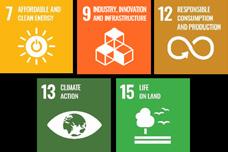
UN SDG Contributions

ESG Goals
1. Significantly reduce Scope 1, 2, and 3 greenhouse gas emissions by improving energy efficiency, transitioning to renewable energy, and managing emissions from logistics and travel.
2. Minimise waste generation by enhancing recycling, promoting reuse, and prioritising sustainable and recyclable materials through circular economy practices.
3. Strengthen infrastructure and operational resilience by proactively addressing climaterelated risks, implementing green building practices, and managing environmental impacts across events.
4. Responsibly manage natural resources by optimising water use, reducing pollution and protecting soil and land quality.
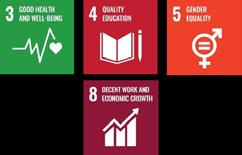

1. Foster a supportive workplace by prioritising employee well-being, worklife balance, and occupational health and safety, creating a resilient and productive workforce.
2. Promote diversity, gender balance, and equal opportunity through inclusive hiring practices, development opportunities, and equitable career advancement.
3. Accelerate nationalisation and talent retention by investing in continuous training and development, preserving Emirati culture and identity, and positioning the organisation as an employer of choice.
4. Uphold fundamental human rights and proactively prevent discrimination, while encouraging employees to actively engage in meaningful volunteerism and community initiatives.
Collaborating with Our Communities, Partners & Suppliers Safeguarding our Assets & Values
Create shared value through meaningful partnerships, inclusive customer experiences, and active community engagement that enhances societal well-being and long-term stakeholder trust.
Uphold the highest standards of governance, integrity, and operational resilience to protect ADNEC Group’s people, data, reputation, and long-term value.
1. Customer Experience & Satisfaction
2. Community Initiatives and Engagement
3. Health & Safety
1. Ethical Sourcing and Supply Chain Oversight
2. Data Security and Integrity
3. Business Ethics and Values
4. Corporate Governance
5. Business Continuity & Resilience
6. Transparency and ESG Disclosures
7. Operational Excellence and Innovation
Relevant
1. Cultural Accessibility and Inclusive Tourism
2. Equitable Access
3. Emirati Culture and Identity
4. Human Rights
5. Product and Service Innovation
6. Youth Engagement & Skills Development
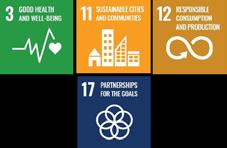
1. Accurate and Timely Communication
2. Board Composition and Diversity
3. Fair Competition
4. Greenwashing Risk and Communication Integrity
5. Project Management
6. Regulatory Compliance
7. Risk Management and Internal Controls
8. Sustainability-Linked Finance Readiness Whistleblowing
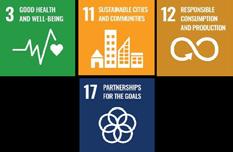


1. Build strong, long-term relationships with local communities through inclusive engagement, impactful initiatives, and support for youth development and education.
2. Ensure safe, culturally inclusive, and accessible products and services that meet the diverse needs of ADNEC Group’s global and local audiences.
3. Drive sustainable growth by embedding human rights, innovation, and ethical practices across our value chain and partnerships.
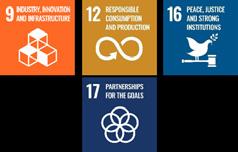

1. Promote ethical conduct, responsible communication, and transparent governance practices that uphold stakeholder trust and regulatory compliance.
2. Strengthen cyber security, business continuity, and risk governance frameworks to ensure secure, adaptive, and futureready operations
3. Ensure strong governance, senior management diversity, and responsible sourcing through robust oversight and alignment with ESG principles.
Priority Area Material ESG Topics GRI
Protecting Our Land, Air, and Seas
Growing and Investing in Our Employees
• Carbon Footprint and Greenhouse Gas emissions
• Energy Efficiency
• Waste Management and Circular Economy
• Sustainable Materials
• Renewable Energy
• Water Conservation and Management
2-23, 2-24, 301, 302, 303, 305, 306
1. Achieve a 50% reduction in Scope 1, 2, and 3 greenhouse gas emissions by 2030, and reach Net Zero by 2045.
2. Consistently enhance energy and water efficiency annually across all operations and facilities.
3. Achieve zero waste to landfill by 2030 through the implementation of robust circular economy practices.
4. Expand the use of sustainable and recyclable materials in infrastructure development, event operations, and procurement activities.
5. Increase the adoption of renewable energy to significantly reduce reliance on fossil fuels.
6. Enhance organisational resilience through proactive management of climate-related risks across all strategic and operational activities.
1. Foster holistic workforce well-being by creating a supportive work environment that enhances employee health, safety, and overall job satisfaction.
Collaborating with Our Communities, Partners, and Suppliers
• Workforce Well-Being
• Work-Life Balance
• Gender Balance and Equal Opportunity
• Nationalisation
• Health & Safety
2-7, 2-8, 2-30, 401, 403, 405, 406
Safeguarding Our Assets and Values
Customer Experience & Satisfaction
• Community Initiatives and Engagement
• Health & Safety
• Ethical Sourcing and Supply Chain Oversight
• Data Security and Integrity
• Business Ethics and Values
Corporate Governance
• Business Continuity & Resilience
Transparency and ESG Disclosures
• Operational Excellence and Innovation
2-25, 2-29, 102-43, 403, 413, 416, 418
2. Promote work-life balance to increase employee engagement, reduce burnout, and support longterm retention and productivity.
3. Achieve equitable gender representation, particularly within leadership roles, and ensure equal opportunities at every organisational level.
4. Prioritise nationalisation efforts by actively hiring, developing, and retaining national talent throughout the organisation.
5. Maintain rigorous health and safety standards to provide a safe, secure, and healthy working environment for all employees.
1. Deliver consistently exceptional customer experiences, fostering high levels of satisfaction and loyalty across all services.
2. Strengthen community relationships through targeted engagement, impactful initiatives, and meaningful local partnerships.
3. Uphold rigorous health and safety standards to provide secure, inclusive, and safe environments for customers, visitors, and partners.
1. Ensure responsible and ethical sourcing throughout our entire supply chain, aligning with internationally recognised ESG standards.
2-3, 2-5, 2-9, 2-10, 2-11, 2-12, 2-13, 2-14, 2-15, 2-16, 2-23, 2-24, 2-25, 2-26, 205, 206, 308, 414, 418
2. Safeguard data security and integrity through robust cybersecurity measures and proactive data governance practices.
3. Uphold the highest ethical standards and corporate governance practices, promoting accountability, transparency, and integrity across all business activities.
4. Strengthen resilience and business continuity planning to effectively mitigate and manage operational disruptions.
5. Provide transparent, accurate, and timely ESG disclosures, fostering trust and confidence among all stakeholders.
6. Continuously drive operational excellence and innovation to optimise organisational performance and enhance market competitiveness.
ADNEC Group maintains robust corporate governance practices to ensure compliance with applicable regulations and alignment with recognised international ESG standards. Our governance framework includes continuous evaluation and measurement of ESG performance, independent oversight to reinforce accountability, and regular refinement of governance structures to effectively address evolving sustainability risks and opportunities. By actively monitoring emerging global sustainability trends, we proactively manage potential challenges, safeguard organisational integrity, and consistently align with international best practices and sustainability objectives.
Entity
Modon Holding Board of Directors
Modon Holding Group CEO
Modon Holding Executive Management Committee
ADNEC Group Managing Director & Group CEO
ADNEC Group Strategy & Sustainability Department
Responsibilities
Establishes the overarching sustainability and ESG strategy for Modon Holding and its subsidiaries, including ADNEC Group. Sets strategic objectives, high-level targets, and priorities aligned with applicable mandates and regulations. Provides oversight through regular reviews of ESG performance against established targets as reported by the Group CEO, ensuring accountability and transparency.
Leads the operational integration and execution of Modon Holding’s sustainability and ESG strategy across all subsidiaries. Ensures subsidiaries adhere to the established ESG framework and achieve set targets. Reports regularly to the Board of Directors on ESG performance, highlighting key achievements, challenges, and recommended actions.
Supports the Group CEO by reviewing and advising on ESG strategic direction, business planning processes, and priorities. Provides guidance on ESG policy development, strategic targets, procedures, risk management, annual goals, and key performance indicators (KPIs).
Provides executive leadership and strategic direction for ADNEC Group’s sustainability strategy and ESG agenda. Ensures full alignment with Modon Holding’s ESG policies, targets, and standards. Oversees the management of ESG performance, risk management frameworks, and sustainability initiatives and projects across the organisation.
Leads the development, implementation, and monitoring of ADNEC Group’s ESG strategy and initiatives. Manages the ESG performance framework, coordinates sustainability activities across all business clusters, ensures alignment with recognised global ESG standards, and facilitates transparent ESG reporting. Advises senior leadership on sustainability best practices, monitors performance against defined ESG objectives, and recommends areas for continuous improvement. Provides regular reporting to the Managing Director and Group CEO, detailing ESG achievements, challenges, and strategic recommendations.
The Strategy & Sustainability Department at ADNEC Group leads ESG awareness and capacity-building initiatives through targeted workshops, knowledge-sharing sessions, and structured training programmes. These programmes are aligned with international ESG standards, promoting continuous learning, enhancing internal capabilities, and driving improved sustainability performance throughout the organisation.
In October 2024, ADNEC Centre Abu Dhabi hosted the 63rd ICCA Congress, becoming the first international congress certified to The PLEDGE’s "Zero Food Waste to Landfill" standard. Through strategic collaboration with Capital Catering, LightBlue Consulting, Ne’ma, and other partners, the event delivered measurable sustainability outcomes:
• 1,977 kg of food waste diverted from landfill.
• 735 surplus meals redistributed locally.
• 4,943 kg CO₂e emissions avoided.
• 54% total waste diversion (37.3% recycling, 16.7% composting).
• 85% reduction in single-use plastics and polystyrene.
• Over 55% vegetarian/vegan meals served.
• 20 water refill stations eliminating single-use plastic bottles.
• 200 hospitality staff trained in sustainable practices.
Strong attendee engagement through sustainability-focused communications resulted in behavioural change, with 81% of participants committed to adopting sustainable practices in their own organisations. Additionally, social impact initiatives, including vocational workshops with People of Determination and wellness sessions, enriched the delegate experience and fostered new sustainability partnerships among local suppliers.

In 2025, ADNEC Group will host the IUCN Congress, one of the world’s leading environmental forums, bringing together over 1,400 organisations and 17,000 experts from more than 160 countries. Recognised globally as an authoritative voice on conservation, the International Union for Conservation of Nature (IUCN) drives international collaboration on critical sustainability challenges.
Leveraging existing sustainability measures at ADNEC Centre Abu Dhabi, including circular waste management, AI-driven energy optimisation, sustainable catering, and impact measurement, ADNEC Group will deliver the Congress in alignment with IUCN’s rigorous standards.
The event will also highlight the UAE’s leadership in sustainability and net-zero emissions ambitions, showcasing scalable sustainable event practices in partnership with EWEC, Ne’ma, and other strategic entities.
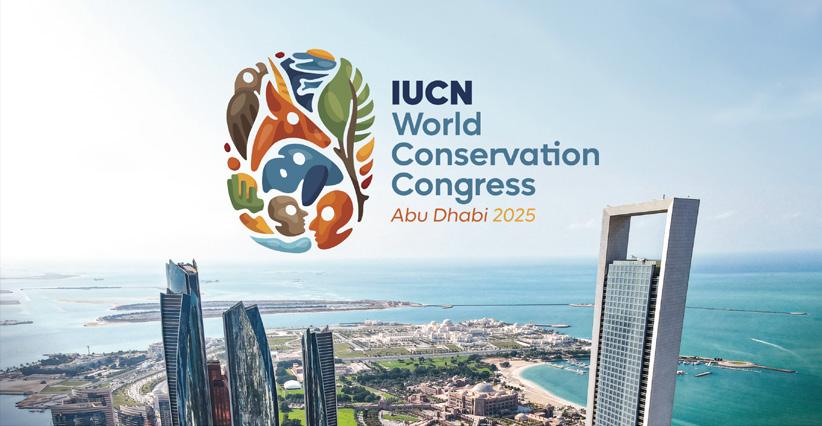
In 2024, ADNEC Centre Abu Dhabi launched a landmark clean energy partnership with Emirates Water and Electricity Company (EWEC), becoming the region’s first and largest event venue to integrate clean energy into operations as part of its journey towards net-zero emissions by 2045.
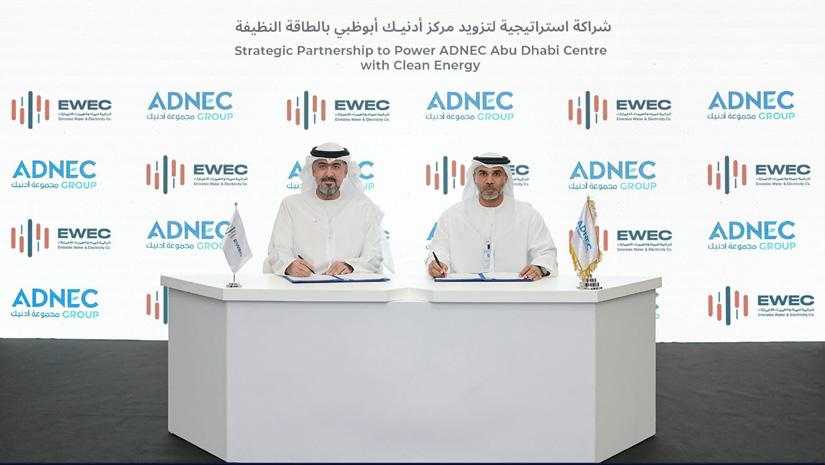
Through Abu Dhabi’s Clean Energy Certificate (CEC) scheme, ADNEC Centre Abu Dhabi verifies that its electricity consumption is fully sourced from carbon-free nuclear, wind, and solar power. Regularly redeemed certificates accurately reflect the Centre’s monthly electricity use, enabling precise reporting of Scope 2 emissions reductions aligned with international standards. This initiative significantly supports ADNEC Group’s strategic objective of reducing absolute emissions by 50% by 2030.
This partnership also strategically benefits both organisations: EWEC achieves increased visibility through integrated marketing and event branding at ADNEC Centre Abu Dhabi, while ADNEC Group solidifies its leadership in sustainable venue management, actively promoting the UAE’s clean energy transition across sectors and stakeholders.
In January 2025, ADNEC Group advanced its Net Zero Transition Plan by signing a 15-year Power Purchase Agreement (PPA) with Positive Zero at the World Future Energy Summit. Under this agreement, a 5 MWp rooftop solar photovoltaic (PV) system will be installed at ADNEC Centre Abu Dhabi, supplying approximately 8.57 million kWh of renewable energy annually, meeting nearly 30% of the venue’s electricity demand and reducing annual carbon emissions by approximately 6,000 metric tonnes.
Managed by SirajPower, Positive Zero’s generation arm, the installation employs a nonpenetrating mounting method to preserve rooftop integrity. Implementation follows thorough structural assessments and feasibility studies, guided by a dedicated cross-functional steering committee representing Facilities Management, Operations, Strategy, and Sustainability. Realtime monitoring post-installation will optimise performance and verify emissions reductions.
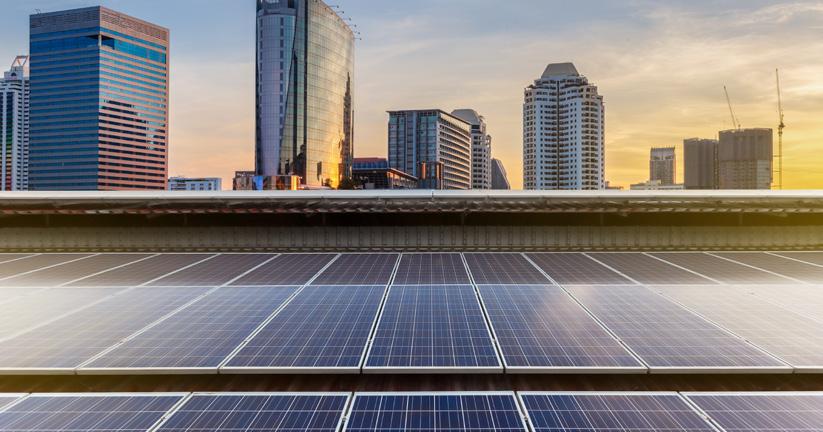
This renewable energy initiative significantly reduces ADNEC Centre’s reliance on grid electricity, enhancing operational resilience and reinforcing ADNEC Group’s leadership in sustainable venue management.
As part of its commitment to smart and sustainable innovation, ADNEC Group implemented an advanced AI-driven Building Management System (BMS) at ADNEC Centre Abu Dhabi in 2024. This intelligent system utilises artificial intelligence and automation to significantly reduce energy consumption, enhance occupant comfort, and maximise operational efficiency.
The project addresses three primary objectives:
• Infrastructure Modernisation: Upgrading legacy systems to smart, interconnected infrastructure.
• Energy Analytics & Sustainability: Real-time monitoring and automated energy optimisation.
• Digitalisation: Transitioning to data-driven, AI-enabled facility management.
The AI-powered BMS continuously monitors environmental conditions such as temperature, humidity, cooling loads, fan speeds, and fresh air intake. It dynamically adjusts cooling based on occupancy patterns and event schedules, proactively forecasting and managing energy demands.
Key outcomes include:
• Power Availability & Resilience: Improved reliability and operational continuity.
• Energy Efficiency & Asset Value: Approximately 20% reduction in electricity consumption, lowering costs and emissions.
• Comfort, Safety & Security: Enhanced occupant experience through precise environmental controls.
• Sustainability & Decarbonisation: Significant contribution towards ADNEC Group’s netzero objectives.
A centralised command and control centre, planned for 2026–2027, will further scale these energy optimisation practices across the Group’s key assets.

In 2024, ADNEC Group received the Sheikh Hamdan bin Zayed Environmental Award (Environmental Performance category – Private Sector). Launched by the Environment Agency – Abu Dhabi in partnership with EFQM, the award recognises organisations demonstrating exceptional environmental stewardship aligned with the UN Sustainable Development Goals. This honour highlights ADNEC Group’s 15-year journey of continuous improvement and operational excellence under the EFQM framework, affirming the Group’s leadership in environmental performance. Key sustainability initiatives, including TerraTile, sustainable event operations, and comprehensive waste and resource management, underscore ADNEC’s position as a regional leader in integrated ESG transformation.
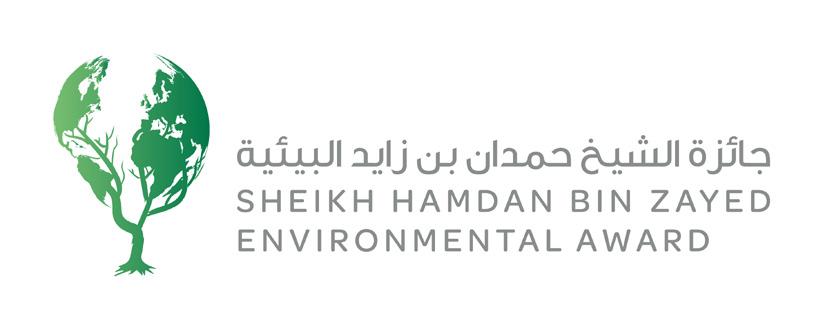
ADNEC Group was awarded the Excellence in Strategic Supply Chain Partnership at the 2025 International Procurement & Supply Chain Awards, recognising its structured, ethical, and collaborative procurement practices. The award highlights ADNEC’s effective cross-departmental collaboration in successfully delivering the 5 MWp rooftop solar photovoltaic (PV) project at ADNEC Centre Abu Dhabi, underscoring the Group’s commitment to strategic procurement and sustainability excellence.
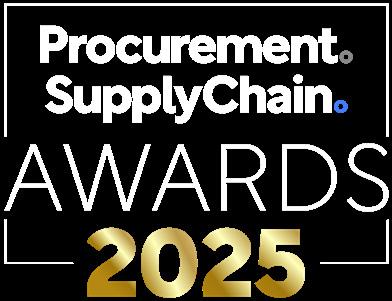
The rooftop solar PV project at ADNEC Centre Abu Dhabi also received the "Best Energy Management Initiative" award from the Abu Dhabi Sustainability Group (ADSG), recognising ADNEC Group’s leadership and proactive approach in adopting renewable energy solutions and advancing sustainable energy management practices.
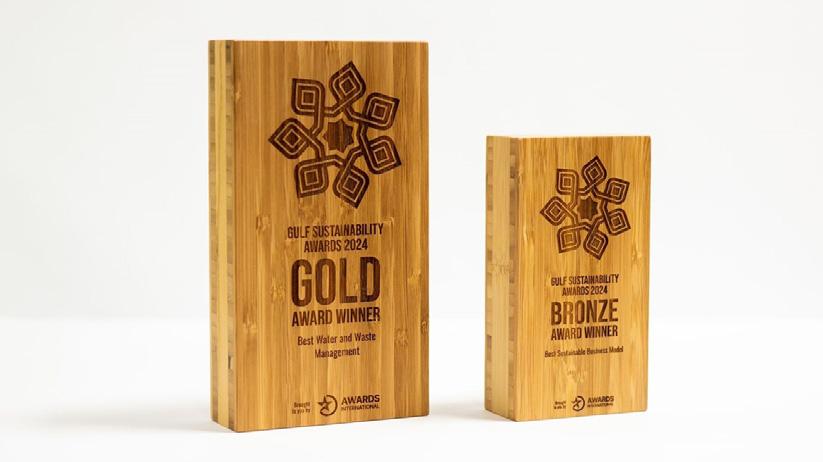
Recognised for leading sustainable water and waste management practices, notably the deployment of advanced food-waste conversion technology significantly reducing landfill contributions.
Awarded for the pioneering "Zero Food to Landfill" initiative in partnership with Ne’ma Food waste initiative, including zero-food-waste events, community meal redistribution, and conversion of surplus food into compost for local farms.
These awards highlight Capital Catering’s innovative integration of circular economy principles, focusing on food waste management, resource recovery, community impact, and emissions reduction.

• EN Gold Award – ESG (2025)
Honoured for its Sustainability Report 2023–24, commitment to transparently reporting ESG performance, and ambitious long-term targets focused on minimising environmental impacts and maximising social value.

• EN Gold Award – Exhibition Venue of the Year (2025)
Awarded at the prestigious 18th annual Exhibition News (EN) Awards, recognising Excel London as the leading exhibition venue. Triumphing among ten internationally acclaimed finalists, including ADNEC Centre Abu Dhabi, Business Design Centre, and RAI Amsterdam, this marks Excel London's third win in four years, reflecting its consistent excellence, innovation, and ongoing investment in enhancing visitor, exhibitor, and organiser experiences.
• Venue & Catering Silver Award – Sustainability (2024)
Acknowledged for consistent sustainability performance across both venue operations and catering services.
• Sustainability Award for Venues
Recognised for exceptional environmental performance and being the first UK venue of its kind to achieve B Corp Certification, embedding ESG commitments within its governance structure. BDC’s sustainability efforts resulted in a significant 73% reduction in carbon emissions over four years, supported by initiatives encouraging reduced environmental footprints among organisers and attendees.
• Bronze Award – Best Venue (500–1,100 Theatre Style)
Honoured for consistently excellent event management standards, customer satisfaction, and venue service quality. In 2023, BDC hosted over 100 successful events, reinforcing its premier venue reputation through strategic investments in customer experience, diversity and inclusion initiatives, and workplace excellence, recognised by Superbrand status and inclusion in The Sunday Times Best Places to Work.
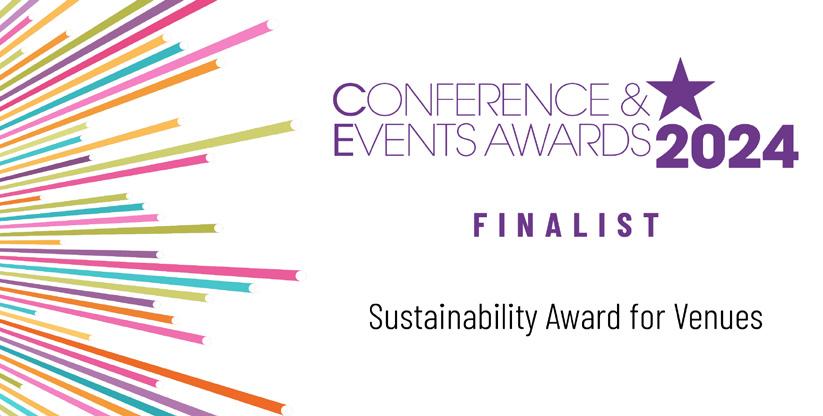
Innovation is integral to ADNEC Group’s strategy, underpinning our commitment to sustainable growth and competitive advantage in an evolving market. It involves discovering new ideas, streamlining processes, and delivering practical solutions that address operational challenges and achieve measurable ESG impacts. In 2024, we retained our ISO 56000 Innovation Management certification, reaffirming our commitment to global innovation standards.
Our updated innovation strategy includes clear goals, defined performance metrics, and indices to foster creativity, collaboration, and impactful ideation organisation-wide. Central to this approach is our Leadership Innovation Pledge, which cultivates a culture of curiosity, continuous improvement, and informed risk-taking.
To further embed innovation, we introduced the MyIdea digital platform, enabling employees across all seven business clusters to propose, collaborate on, and implement solutions supporting sustainable growth and operational efficiency.
Additionally, we successfully concluded the sixth cycle of Tanfeeth, our Innovation Accelerator Programme, significantly advancing our culture of creativity and transformation. Senior leadership actively participated, with C-suite executives providing strategic guidance and expert insights during pitching sessions, demonstrating our organisation-wide commitment to innovation excellence.
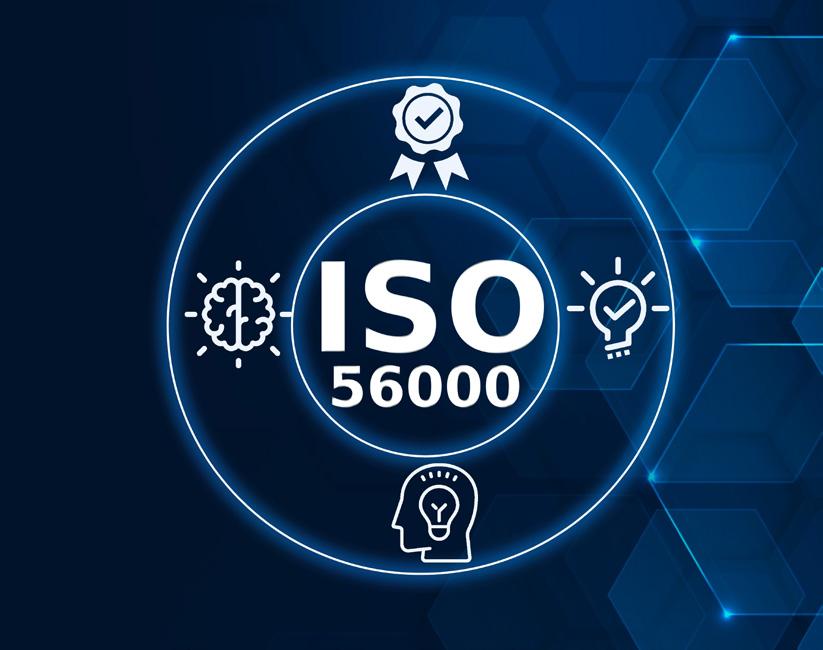
ADNEC Group has established a structured sustainability framework closely aligned with its overarching Group Strategy Plan. This integrated approach provides a strategic foundation to systematically embed sustainability across all operations, prioritising environmental initiatives according to clearly defined criteria such as scope, environmental and social impact, complexity, and budget considerations.
To foster environmental responsibility, the Group conducts regular sustainability awareness sessions and training programmes for employees and suppliers across all subsidiaries. These efforts are complemented by active participation in community dialogues, benchmarking studies, and knowledge-sharing forums focused on environmental stewardship and eco-design.
All major ADNEC Group assets and facilities hold ISO 14001 certification for Environmental Management Systems, demonstrating adherence to international best practices. Additionally, the Group maintains ISO 20121 certification for sustainable event management and Health and Safety certification, reinforcing its leadership in responsible operations and sustainable venue management.
The Percentage of Company’s Sites and Offices with ISO 14001 Certification
Net zero refers to the balance achieved when the quantity of greenhouse gas (GHG) emissions released into the atmosphere is matched by an equivalent amount removed. Achieving net zero requires substantial emission reductions alongside the permanent neutralisation of any residual emissions through scientifically validated carbon removal methods.
Unlike carbon neutrality, which typically involves offsetting unavoidable emissions via carbon credits from renewable energy or efficiency projects, net zero represents a more stringent, science-based climate objective aligned with the Paris Agreement’s goal of limiting global temperature rise to 1.5°C.
ADNEC Group has accelerated its decarbonisation journey by launching a comprehensive Net Zero commitment. Guided by the Greenhouse Gas (GHG) Protocol and aligned with the Science-Based Targets initiative (SBTi), the Group established 2022 as its baseline year and committed to a robust, scientifically validated emissions-reduction pathway.
This commitment encompasses all emissions categories, Scope 1 (direct emissions), Scope 2 (indirect emissions from purchased energy), and Scope 3 (value-chain emissions), across ADNEC Group’s business clusters, assets, and operations.
Reduce absolute Scope 1 and 2 emissions by at least 50% & ensure that suppliers representing 67% of Scope 3 Purchased Goods and Services have adopted sciencebased targets aligned with the 1.5°C pathway.
Achieve a minimum 90% reduction in Scope 1 & 2 emissions.
Reach full net zero across Scopes 1, 2, and 3, with any residual emissions (no more than 10%) neutralised through accredited carbon removal solutions only, such as direct air capture or longterm bio-based sequestration.
In 2024, ADNEC Group launched its Net Zero Transition Plan, marking a decisive advancement toward fulfilling its commitment to achieve net zero greenhouse gas emissions by 2045. Aligned with the Science Based Targets initiative (SBTi) and the UAE Net Zero 2050 strategic initiative, the plan establishes a clear, Group-wide emissions reduction pathway covering Scope 1 (direct emissions), Scope 2 (indirect emissions from purchased energy such as electricity, district cooling, and steam), and Scope 3 (value chain emissions, including procurement, travel, and logistics).
Recognising that Scope 2 and Scope 3 represent most of its emissions, primarily from energy consumption and procurement, ADNEC Group prioritises initiatives such as clean energy agreements, renewable energy investments, energy efficiency projects, demand management, and supplier decarbonisation. Key actions in 2024 included establishing clean energy sourcing agreements, deploying AI-driven energy optimisation systems across major facilities, commissioning significant solar PV installations, and accelerating supplier engagement to reduce emissions.
Structured into four phases: immediate, near-term, mid-term, and long-term, the Transition Plan combines robust measurement systems and governance structures with tangible climate actions. These include transitioning to sustainable infrastructure, integrating emission reduction criteria into procurement processes, and fostering a net-zero mindset among employees. By embedding climate action into core business operations, ADNEC Group not only reduces its environmental impact but also strengthens organisational resilience and readiness for future sustainability challenges.
2022A - The reported carbon emission metrics have been re-baselined to exclude ADNEC Hotels, covering Scope 1, Scope 2, and all relevant Scope 3 emission categories, including Purchased Goods and Services, Capital Goods, Fuel- and Energy-Related Activities, Upstream Transportation and Distribution, Waste, Business Travel, Employee Commuting, Upstream Leased Assets, and Investments.
2023B - The reported carbon emission metric has been re-baselined, excluding ADNEC Hotels, and includes Scope 1, Scope 2, and only the core elements of Scope 3 emission categories.
2024C - Due to ADNEC Group's acquisition by Modon Holding and the subsequent asset transfer, our carbon footprint baseline will be updated from 2022 to 2024. The reported emissions data may undergo further amendments upon finalisation of the rebaselining exercise.
Our updated and re-baselined year 2022 carbon footprint of 146,279 tCO₂e covers all relevant GHG Protocol categories including extended scope 3 emissions. Our carbon footprint scope 3 emissions are broken down as follows:
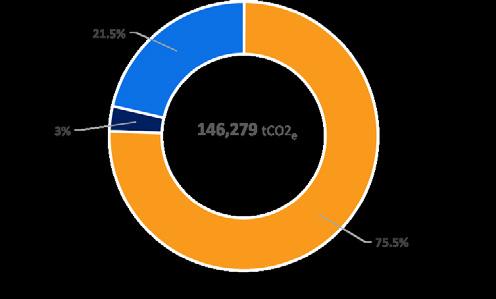
Scope 1
Scope 2
Scope 3
Moving forward, we will refine our data quality, particularly for Scope 3, by transitioning from spend-based to activity-based or supplier-specific emission factors.
Reporting Period: 1 January 2022 to 31 December 2022 – Baseline Year
Reporting Boundary: Scope 1, Scope 2 and extended Scope 3 ( all applicable categories )
Scope 2 District Cooling
Scope 3 Business travel
Total Scope 1
Carbon Footprint [Location-based]
Carbon Footprint [Market-based]
Reporting Period: 1 January 2022 to 31 December 2022 – Baseline Year
Reporting Boundary: Scope 1, Scope 2 and extended Scope 3 ( all applicable categories )
/ Entity
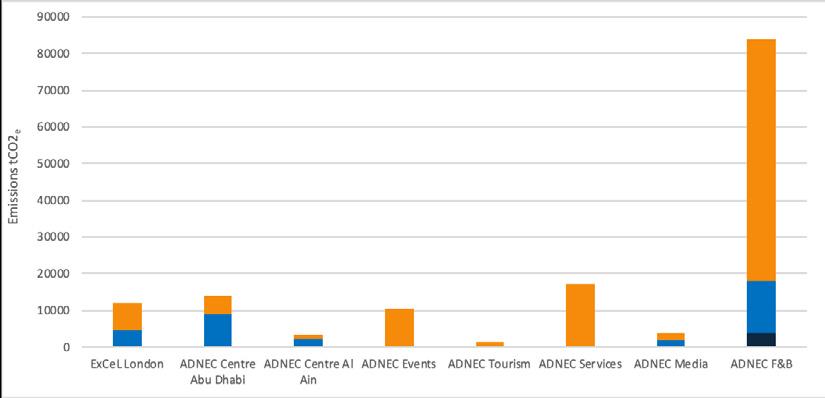
ADNEC Group’s journey to achieving net zero by 2045 follows a structured, phased approach combining technology, operational excellence, and stakeholder collaboration. Our Net Zero Transition Plan outlines a clear roadmap structured around three distinct phases:
• Immediate and Near-Term (2023–2030)
• Mid-Term (2030–2035)
• Long-Term (2035–2045)
Each phase activates targeted initiatives to systematically reduce emissions across our operations and entire value chain.
Central to this strategy is our transition to ethical procurement and proactive supplier engagement. Given that most of ADNEC Group’s emissions occur within Scope 3, primarily linked to our supply chain, we actively collaborate with key suppliers to set science-based targets and integrate sustainability performance into procurement decisions. This strategic engagement not only drives significant emissions reductions but also fosters broader industry responsibility for climate action.
From clean energy adoption and advanced building technologies to supplier transformation and future-focused innovations, ADNEC Group’s decarbonisation approach delivers measurable results, enhances resilience, and contributes meaningfully to national and global climate goals.
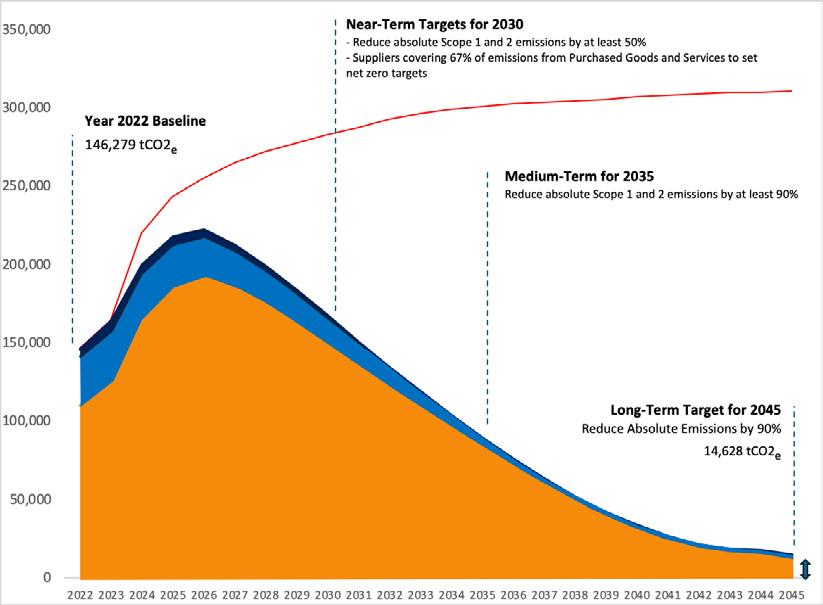
• Carbon Baselining and NetZero Transition Plans
• Waste Management Initiatives
• ADNEC Centre Abu DhabiClean Energy Agreement & AI Energy Optimisation Projects
• Excel London - Electricity Submetering, Voltage Optimisation & Lighting Controls
• Ethical Procurement Framework Development
• Data Collection / Reporting / ESG IT Solution
• ADNEC Centre Al Ain Clean Energy Agreement, On-site PV & Energy Audit
• ADNEC Centre Abu Dhabi Onsite PV & Energy Audit
• Excel London - Onsite PV (Phases 1 & 2), HVAC Controls & Voltage Optimisation
• ADNEC F&B – Voltage Optimisation
• ADNEC Media – Energy Audit & Clean Energy Trade Agreement
• Fleet Decarbonisation Phase 1
• Group-wide Lighting Redesign, Controls
• Group wide Energy Audits / ESCO Shared Savings Agreements
• Building Envelope Upgrades
• Travel Fleet Decarbonisation - Phase 2
• Environmentally Friendly Refrigerants
• Boilers & Heat Pump Upgrades
• Material lifecycle Analysis
• Transition Scope 3 emissions spend to activity based.
• Supplier awareness & training
Excel London is committed to achieving net-zero emissions through an ambitious Net Zero Transition Plan, closely aligned with ADNEC Group’s sustainability vision and international best practices, including the Science Based Targets initiative (SBTi). This plan establishes clear interim and long-term reduction targets covering Scope 1, 2, and 3 emissions, supported by targeted initiatives, strategic supplier engagement, and rigorous governance oversight.
Excel London’s specific net zero commitments include:
• 50% absolute reduction in Scope 1, 2, and 3 emissions by 2030
• 90% reduction in Scope 1 and 2 emissions by 2040
• 90% reduction in Scope 3 emissions by 2045, with residual emissions (maximum 10%) neutralised through accredited carbon removals.
The following sections outline Excel London’s phased approach, critical decarbonisation projects, and collaborative strategies to achieve these targets by 2045.

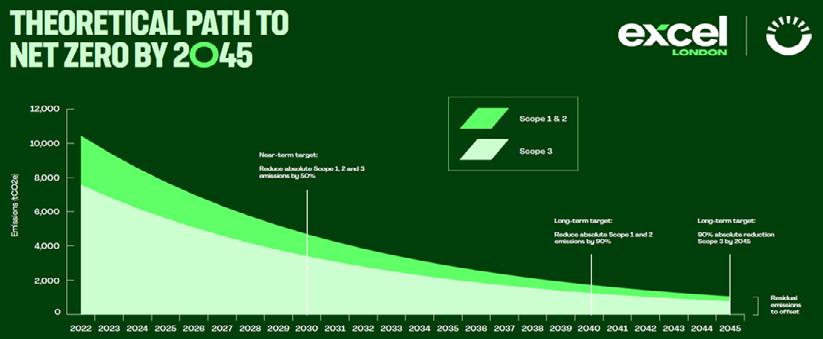
The Net Zero Transition Plan outlines over 20 initiatives grouped by implementation timeframe:
Implemented and Near-Term (2022–2030):
• Full electricity submetering rollout
• Replacement of remaining non-LED lighting
• Phased rooftop solar PV installation
• Voltage optimisation and AC smart controls
• Electrification of vehicle fleet
• Rollout of sustainability reporting to event organisers
• Policy changes mandating carbon criteria in procurement
• Supplier net zero engagement and training programme
Medium and Long-Term
• Full transition from natural gas by 2035 (to be scoped in 2025/2026)
• Decarbonisation of all support infrastructure and fleet
• Cross-sector collaboration to reduce embedded supply chain emissions
• Continuous governance review and annual target recalibration
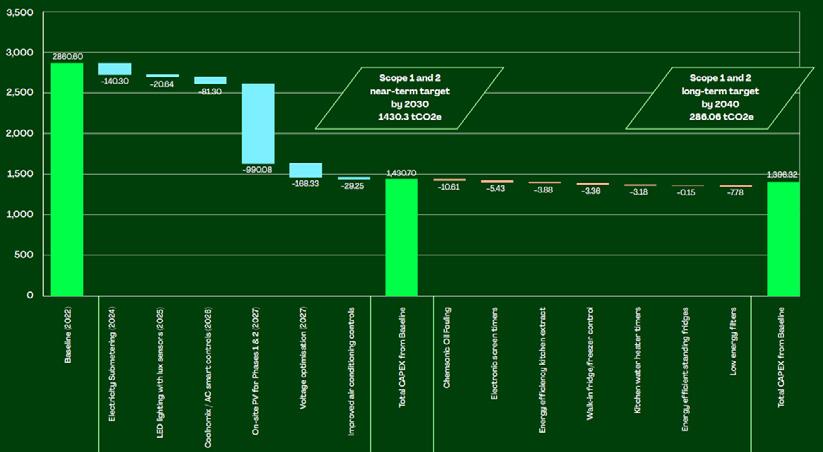
Purchased goods and services, the largest emissions source, are mapped by supplier and product category. A Supplier Maturity Assessment was conducted for top vendors:
• 44.1% of emissions came from category 1 suppliers in 2022.
• Suppliers with the lowest sustainability maturity scores (3) and will be prioritised for education and engagement.
• Suppliers with net zero targets in place and are expected to contribute positively to Excel’s emissions reduction curve.
The Business Design Centre (BDC) is committed to achieving net-zero emissions by 2030 through accelerated decarbonisation efforts. Working closely with carbon consultants at ecollective, BDC annually measures and reduces its carbon footprint according to the GHG Protocol and Science Based Targets initiative (SBTi) guidelines. By 2024, BDC achieved a substantial 75% reduction in carbon emissions from its 2018 baseline, decreasing annual emissions from approximately 1.34 million kg CO₂e to around 337,000 kg CO₂e. This represents a significant improvement from roughly 78 kg CO₂e/m² in 2018 to 19.5 kg CO₂e/m² in 2024.
• Comprehensive Emissions Scope: Fully accounting for Scope 1, 2, and 3 emissions.
• Renewable Energy Procurement: Sourcing 100% renewable electricity since 2019, effectively eliminating Scope 2 emissions (market-based).
• Targeted Emissions Reduction: Prioritising reductions in remaining Scope 1 emissions (on-site heating and catering) and Scope 3 emissions (commuting, waste, supply chain).
• Robust Reporting & Monitoring: Implementing a rigorous Carbon Emissions Framework ensuring detailed tracking, annual measurement, and alignment with international best practices.
BDC’s emissions trajectory from 2018 through 2024 demonstrates significant progress and key milestones:
• 2019: Rapid emissions reduction following transition to 100% renewable electricity.
• 2020: Temporary decline due to reduced operations during the pandemic.
• 2023–2024: Stabilisation of emissions at approximately 0.34 million kg CO₂e, consistently lower than pre-2019 levels.
BDC is firmly on track to surpass an 80% reduction in emissions by the next assessment, progressing toward the ultimate target of eliminating or neutralising all remaining Scope 1 and Scope 3 emissions by 2030
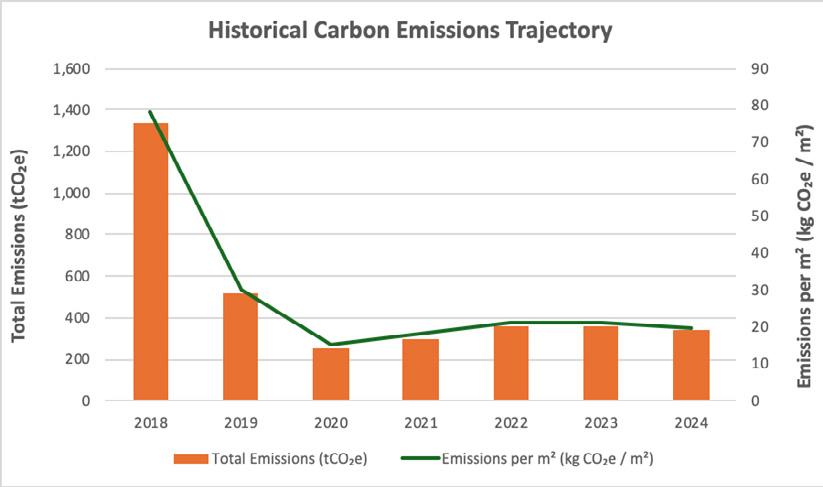
Year
Total Emissions (tCO₂e)
Emissions per m² (kg CO₂e/m²)
2018 1,338 78
2019 520 (est.) 30 (est.)
2020 250 (est.) 15 (est.)
2021 300 (est.) 18 (est.)
2022 359 21
2023 358 21
2024 337 19.5
Key Initiatives & Milestones
Baseline year for carbon footprint measurement
Transitioned to 100% renewable electricity; eliminated Scope 2 emissions
Significant temporary reduction due to COVID-19 operational pause
Resumed operations with efficiency measures; maintained CarbonNeutral· certification
Achieved ~73% emission reduction vs. 2018; partnered with ecollective to refine decarbonisation roadmap
Replaced gas kitchen appliances with electric induction units, significantly reducing Scope 1 emissions; achieved B Corp Certification (Aug 2023)
Achieved 75% total emission reduction vs. 2018 baseline; on track to meet Net Zero 2030 target; continued efficiency improvements and enhanced supplier engagement
Notes: All emissions are reported in metric tons CO₂ equivalent. 2019–2021 values are approximate, reflecting major changes (renewable energy adoption and pandemic disruptions). From 2022 onward, data are based on verified annual footprints. Per m² figures use BDC’s gross floor area as the denominator (constant), illustrating improved carbon intensity of operations.
Our materiality assessment identified energy efficiency as a priority issue within ADNEC Group’s ESG Strategy. In line with our Net Zero Transition Plan, the Group has launched numerous energy efficiency and demand-management initiatives across key business clusters. These efforts are particularly impactful in large-scale properties such as ADNEC Centre Abu Dhabi and Al Ain, Excel London, ADNEC Media facilities, and ADNEC F&B kitchens.
ADNEC Group has implemented a group-wide transition from conventional lighting (including fluorescent and halogen fixtures) to energy-efficient LED lighting. This initiative significantly reduces electricity consumption, directly supporting our near-term Scope 2 emissions reduction targets.
ADNEC Group has deployed or is in the process of installing advanced lighting control systems, including motion-activated lighting, across all facilities to enhance energy efficiency and further reduce unnecessary electricity usage.

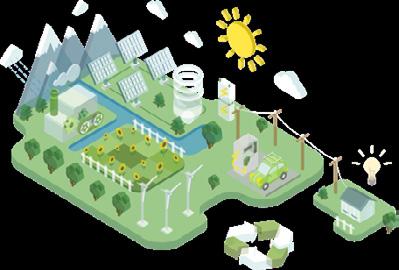
Aligned with the Net Zero Transition Plan, ADNEC Group signed a 15-year Power Purchase Agreement (PPA) in January 2025 to install a 5 MWp rooftop solar photovoltaic (PV) system at ADNEC Centre Abu Dhabi. Managed by SirajPower, the system will produce approximately 8.57 million kWh of clean electricity annually, meeting nearly 30% of the venue’s energy needs and reducing carbon emissions by around 6,000 metric tonnes per year. The installation features a nonpenetrating mounting system and real-time monitoring to ensure optimal performance and alignment with sustainability objectives.
Since November 2024, ADNEC Centre Abu Dhabi has been fully powered by zero-emission clean energy through a landmark partnership with Emirates Water and Electricity Company (EWEC). By redeeming Clean Energy Certificates (CECs) matching monthly electricity usage, ADNEC ensures all its power comes from nuclear, solar, and wind sources. This milestone significantly contributes to the Group’s goal of achieving a 50% reduction in Scope 1 and 2 emissions by 2030, reinforcing its position as a leader in sustainable venue operations.
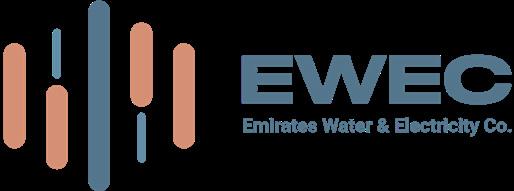
ADNEC Group will continue scaling its clean and renewable energy initiatives across key assets. Planned initiatives include voltage optimisation, HVAC controls, and electricity submetering at Excel London; solar PV installations and energy audits at ADNEC Centres in Abu Dhabi and Al Ain; and clean energy trade agreements and energy audits across F&B and media clusters. These targeted measures will be critical to achieving the Group’s ambitious 2030 emissionsreduction targets.
302-3
302-3
*Electricity Consumption (KWh) – ADNEC Centre Abu Dhabi, ADNEC Centre Al Ain & Excel London
Consumption Per Event (KWh / Event) –
Consumption Per Event (KWh / Event) – ADNEC Centre Abu Dhabi, ADNEC Centre Al Ain & Excel London
*Energy consumption metrics for ADNEC Venues (across the entire business cluster) have been introduced and will be reported from 2024 onwards.
In line with its environmental sustainability commitments, ADNEC Group incorporates water management and efficiency as a core component of its ISO 14001 and ISO 20121-certified Environmental Management Systems. Responding proactively to global water scarcity and rising consumption risks, the Group implements targeted measures to reduce water usage, optimise efficiency, and foster behavioural change among stakeholders. Key initiatives include:
Water-Saving Installations
Aerators and flow regulators have been installed on washbasins, kitchen taps, and toilet trigger sprays across ADNEC facilities, significantly reducing water consumption.
AI-Powered Robotic Floor Cleaners:
Two autonomous robotic floor-cleaning machines that significantly reduce water use, efficiently covering large areas without manual intervention.
Three floor scrubbers employing ec-H₂O™ technology, which electrically converts water into an effective cleaning solution, eliminating chemical detergents. These scrubbers reduce water use by up to 70%, allow up to three times longer cleaning per tank, and improve safety through increased floor traction, certified by the National Floor Safety Institute and NSF-certified for foodhandling environments.
These systems collectively deliver cost reductions, minimise environmental impact, and enhance operational safety and efficiency.


Regular audits and risk assessments specifically target water use, efficiency measures, and associated operational risks.
GRI Material ESG Metrics
Prevention of Pollution
306-3 No. of Spills Recorded (Major) 0 0
Awareness and training
Regular training sessions and workshops engage employees and external stakeholders on water conservation, global water challenges, and practical efficiency practices.
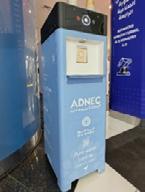
Water Management
303-5
In 2024, ADNEC Centre Abu Dhabi expanded its deployment of 20 atmospheric water generation (AWG) systems across the venue. These innovative dispensers produce clean drinking water directly from atmospheric humidity, offering a sustainable alternative to bottled water during exhibitions and large-scale events. This technology eliminates plastic waste and reduces emissions associated with bottled water production, storage, and transportation. Serving thousands of guests annually, this initiative aligns with ADNEC Group’s broader circular economy objectives, enhancing the sustainability of visitor experiences.
* Water management metrics have been expanded to cover all business clusters within ADNEC Group and will be reported from 2024 onwards.
ADNEC Group continues to advance its digital transformation efforts by reducing reliance on paper-based processes. Frontline staff and cashiers across ADNEC Group-owned restaurants and canteens are equipped with handheld menus wherever possible. Meanwhile, printed brochures and reports have been replaced by digital formats to improve operational efficiency and reduce paper consumption.
To further enhance resource efficiency, a Printing Consolidation Project was launched at Capital Catering’s airport kitchen facility, consolidating all printers under a centralised cloud-based solution. Six energy- and ink-efficient printers were deployed, offering features such as duplex printing, print job monitoring, and secure print release. The system supports waste reduction, strengthens data security through user authentication protocols, and improves productivity by streamlining document workflows and reducing equipment downtime.
Waste management remains a priority within ADNEC Group’s ESG strategy, emphasizing waste reduction, increased landfill diversion, and circular economy integration across operations. In 2024, targeted initiatives across key business clusters addressed specific waste streams, achieving significant sustainability outcomes.
Smart Food Waste Monitoring and Menu Optimisations
Capital Catering deployed advanced technologies, including Chef’s Eye and Winnow, enabling data-driven decisions on menu planning and food procurement, significantly reducing waste volumes.
Chef’s Eye, deployed at one of the UAE’s largest hospitals (SSMC), played a critical role in aligning food production with actual consumption, significantly reducing post-consumer plate waste, one of the most challenging forms of food loss.
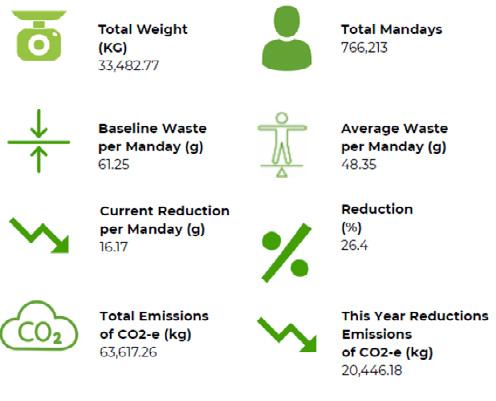

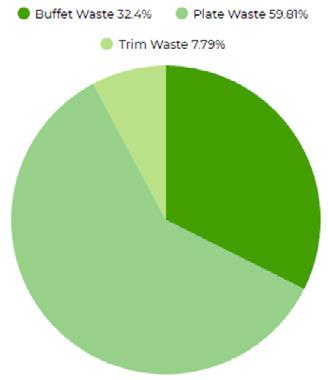
Key outcomes achieved in 2024 through the Chef’s Eye system at SSMC include:
• Total food waste recorded: 33,482.77 kg across 766,213 meals served
• Average waste per man-day: reduced from 61.25 g to 48.35 g.
• Net reduction per man day: 16.17 g (a 26.4% decrease).
• CO₂e emissions avoided: 20,446.18 kg, equivalent to substantial Scope 3 reductions from procurement and disposal practices.
• Plate waste accounted for the largest share at 59.81%, followed by buffet waste (32.4%) and trim waste (7.79%).
These outcomes demonstrate how targeted digital interventions can lead to significant operational and environmental gains. The success of this initiative reinforces the value of ADNEC Group’s partnership with Ne’ma, the UAE National Food Loss and Waste Initiative, and supports broader food system sustainability goals by:
• Minimising procurement of surplus raw ingredients
• Reducing post-consumer waste
• Lowering embodied emissions in food production
• Encouraging behavioural change among kitchen staff and guests
Capital Catering sources ~20% of its products from local UAE farms, with up to 45% of event menus featuring locally grown ingredients, reducing food miles and supporting local agriculture.
Capital Catering converts used cooking oil into biodiesel across three major facilities:
• ADNEC Centre Abu Dhabi: Cooking oil is converted to biodiesel onsite, powering small machinery around the venue. Managed entirely in-house, this initiative supports both sustainability goals through recycling and financial objectives via cost savings.
• Airport Kitchen Facility: Used cooking oil is collected by a specialized partner, converted to biodiesel, and commercially resold, generating additional revenue.
• SSMC Hospital: Like the airport facility, used cooking oil is collected by a specialized partner and converted into biodiesel for commercial resale.
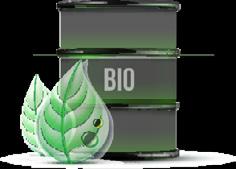
In 2024, Capital Catering commissioned two WasteMaster units at its airport kitchen facility, the largest aviation catering operation in Abu Dhabi, which produced approximately 24.4 million meals over the year. The units process up to 1.2 tonnes of food waste per day (equivalent to roughly 430 tonnes annually) using a closed-loop, thermal decomposition method that requires no water, additives, enzymes, or microorganisms. The process yields a nutrient-rich, odourless compost, which is redistributed to local farms to support sustainable agriculture and circular resource use.
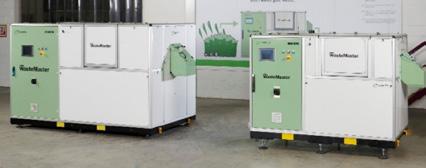
Plans are underway to expand compost application to landscaping and soil enhancement across Modon Holding’s wider property portfolio, contributing to a low-carbon, regenerative food system.
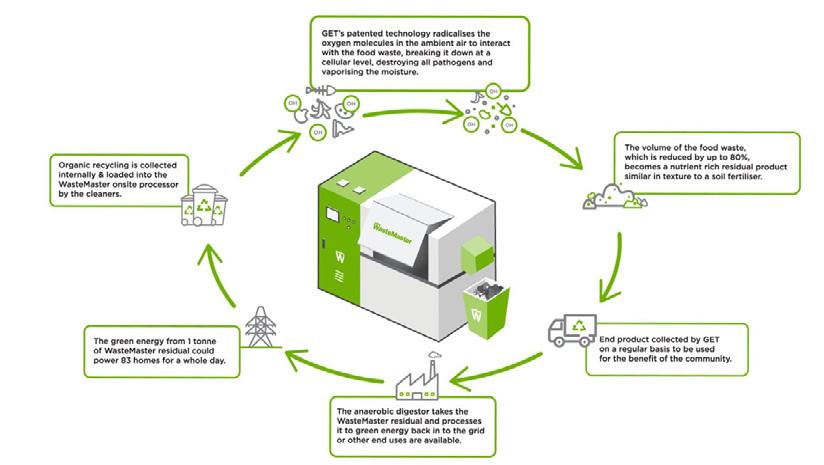
As one of the region’s premier event venues, ADNEC Centre Abu Dhabi continues to strengthen its waste management practices in line with circular economy principles, significantly reducing landfill reliance. The venue has adopted comprehensive multi-stream waste segregation covering plastics, paper, glass, metal, wood, and general waste. Supported by clearly labelled bins, robust back-of-house procedures, targeted awareness campaigns, and active partnerships with specialised waste management providers, these measures ensure accurate sorting, minimise contamination, and enhance the overall quality and recyclability of collected materials.
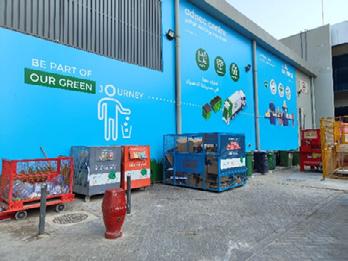
In 2024, ADNEC Centre Abu Dhabi diverted 659.97 tonnes of waste across six key recyclable streams, achieving a waste diversion rate of 52.7%. This includes:
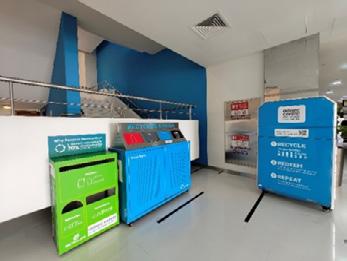
To encourage behavioural change and responsible waste disposal, ADNEC Centre Abu Dhabi has strategically installed 14 Reverse Vending Machines (RVMs) throughout the venue. These machines accept used plastic bottles and metal cans, rewarding users with immediate incentives, thereby gamifying and enhancing the recycling experience. Actively engaging visitors and exhibitors alike, this initiative significantly increases plastic and metal recovery rates during high-footfall events, while simultaneously raising awareness and promoting circular economy practices.
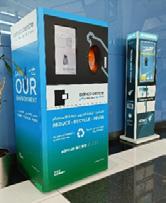
TerraTile is ADNEC Group’s flagship circular economy innovation, an award-winning modular flooring solution made entirely from recycled event waste. Developed collaboratively with Terrax and supported by an R&D grant from ADQ, each tile incorporates over five kilograms of reclaimed polymers and fibrous materials, such as used carpets, providing a durable and sustainable alternative to single-use MDF and plywood platforms.

Designed for up to 100 reuse cycles, TerraTiles are fully recyclable at the end of their lifecycle, allowing remanufacture into new tiles without additional virgin materials or additives, thus achieving genuine circularity. The system enhances operational safety and efficiency by incorporating built-in cable channels to eliminate tripping hazards and removing the need for on-site cutting, significantly reducing noise, particulate matter, formaldehyde, and VOC exposure.
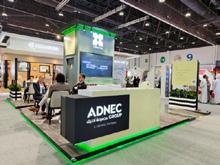

In 2024, ADNEC Group accelerated its efforts to eliminate single-use plastics across all F&B venues, restaurants, and operations. Plastic cutlery has been fully replaced with compostable, plant-based alternatives, including utensils made from locally sourced palm tree leaves. These sustainable alternatives match the functionality and user experience of traditional cutlery while safely biodegrading without releasing harmful toxins, supporting the Group’s zero-waste objectives and promoting sustainable foodservice practices.
Additionally, traditional plastic water bottles have been substituted with environmentally responsible solutions such as glass and biodegradable plantbased bottles, significantly reducing plastic waste across ADNEC Group’s event spaces.
These initiatives build upon Capital Catering’s prior sustainability measures, such as sustainable packaging for food trucks and the Good Life coffee shop, as well as collaboration with a UAEbased startup producing palm-leaf utensils, reinforcing our ongoing commitment to local innovation, circular economy practices, and low-impact sourcing.
* Waste management metrics have been expanded to cover all business clusters within ADNEC Group and will be reported from 2024 onwards.
In accordance with ISO 14001 and ISO 20121 standards, ADNEC Group maintains a comprehensive Environmental Impact Assessment Register. This register evaluates the environmental effects of daily operations across all business units, assessing each activity by source, potential impacts (e.g., air, water, soil pollution), severity scores, and corresponding mitigation measures.
To ensure compliance and operational preparedness, ADNEC Group implements:
• Biannual Environmental Drills: Simulations of incidents such as chemical spills, oil leaks, and biohazard spills to test and enhance operational readiness.
• Environmental Legal Compliance Register: Actively maintained records ensuring strict adherence to applicable environmental regulations and pollution-prevention requirements.
• Environmental Impact Risk Register: Documentation and tracking of environmental risks, facilitating proactive risk management and continuous improvement of environmental performance.
As a flagship venue within ADNEC Group, Excel London continues to drive sustainability across the events industry through its Connecting Lives strategy and the publication of its 2025 Net Zero Transition Plan, aligned with ADNEC Group’s Net Zero 2045 commitment and the Science Based Targets initiative (SBTi) Corporate Net Zero Standard. Excel London is PAS 2060-certified for carbon neutrality, a signatory of the Net Zero Carbon Events Pledge, and a member of the UN Global Compact, reinforcing its leadership in sustainable venue management.
In 2023, Excel launched its formal Sustainability Strategy, structured around five core pillars:
• Sustainable Venue and Events
• People, Culture and Safety
• Community and Platform for Change
• Clients, Partners and Supply Chain
• Governance and Ethics
This strategy is implemented through active focus groups, independently audited action plans, and robust oversight from Excel London’s ESG Committee, aligned with the ADNEC Group ESG framework. Sustainability is firmly embedded in Excel London’s decision-making process through a comprehensive governance structure that promotes cross-departmental accountability and annual reporting. In 2024, Excel London published its inaugural Sustainability Report (2023–24), underscoring its commitment to transparency and continuous ESG improvement.
Excel London continues to achieve 100% landfill diversion, fully embedding the waste hierarchy approach throughout its operations. This commitment is supported by:
• Operating one of the UK's largest wormeries for composting food waste.
• Prioritising recycling and directing residual waste to energy recovery facilities instead of landfill.
• Continual improvement in waste segregation practices and enhanced event-specific waste tracking.
• Regular employee training initiatives and procurement policies aimed at minimising waste generation across all activities.
In partnership with catering provider Levy, Excel London has introduced several sustainability initiatives:
To ensure compliance and operational preparedness, ADNEC Group implements:
• Carbon-labelled menus, clearly communicating the lifecycle environmental footprint of menu items.
• Plant-forward and seasonal food choices, prioritising locally sourced produce and eliminating air-freighted ingredients.
• A commitment to achieving 100% reusable packaging by 2027, significantly reducing waste and promoting circular practices.
Excel London ensures responsible sourcing of goods and services by:
• Integrating ESG and human rights criteria into procurement policies.
• Prioritising local suppliers to support community economic resilience.
• Developing and enforcing robust sustainable procurement criteria
• Actively collaborating with venue partners and suppliers to continuously enhance sustainability performance.
In 2025, Excel London will issue new Sustainable Procurement Standards to all suppliers, featuring updated evaluation criteria and mandatory alignment with ADNEC Group’s ESG framework.
Excel London’s Platform for Change actively integrates social impact into its venue operations and events. It supports local charitable initiatives such as Richard House Hospice and collaborates with Every Child Online to tackle digital exclusion. A dedicated Disability Taskforce, alongside participation in the Hidden Disabilities Sunflower Scheme, ensures venue accessibility and inclusivity. Additionally, Excel employs tools like the IMPACT Toolkit and partnerships with #MEET4IMPACT to empower event organisers to embed meaningful social impact and educational programmes into their events.
In partnership with the University of East London’s Sustainability Research Institute, Excel London completed a comprehensive biodiversity audit in 2024 to guide future environmental initiatives and greening strategies across its estate. These findings directly inform upcoming development projects, including the ICC Expansion (scheduled for 2025), which targets a BREEAM 'Excellent' certification. Planned sustainability interventions include the integration of native landscaping, living walls, and sustainable drainage systems (SuDS) designed to manage surface water runoff effectively and strengthen on-site ecological resilience.
BDC has a longstanding commitment to supporting its workforce and local community, alongside a continuous focus on improving environmental performance. Notably, BDC became the first venue of its kind to achieve carbon neutrality in 2010 and has maintained its CarbonNeutral® certification for 15 consecutive years. Since achieving B Corporation certification in 2023, BDC continues to uphold rigorous standards of accountability, transparency, and excellence across environmental and social performance.
BDC’s commitment to environmental sustainability is demonstrated through targeted energy efficiency initiatives and continuous operational improvements. In 2023, BDC fully retrofitted its catering kitchens, transitioning from gas to electric induction cooking to eliminate a significant source of Scope 1 emissions. Plans to replace gas-fired heating systems are underway, aiming to entirely eradicate Scope 1 combustion emissions. Since 2019, BDC has procured 100% renewable electricity and continuously invests in energy efficiency enhancements, including LED lighting, motion sensors, and smart energy controls. BDC’s carbon accounting aligns with Science Based Targets initiative (SBTi) methodology, ensuring emission reductions are consistent with limiting global warming to 1.5°C.
BDC also implements comprehensive sustainable operations:
• Zero Waste to Landfill: Achieved through close collaboration with local authorities ensuring recycling, composting, and energy recovery for waste management.
• Recycling Initiatives: Improved waste segregation increased recycling rates to 31.3% in 2024, up from 22% in 2022. The "Donate Not Waste" programme diverts reusable materials to charities.
• "No Disposable Cup Days" Campaign: Launched in 2024, eliminating single-use coffee cups on non-event days to significantly reduce catering waste.
• Rooftop Kitchen Garden: Produces herbs and fresh ingredients for the onsite restaurant, supporting local sourcing, reducing food miles, and enhancing the farm-to-table experience.
• Sustainable Catering Practices: Catering partner provides low-carbon menu options and carbon labelling for conference meals, supporting informed sustainable choices by clients.
Stakeholder engagement remains central to BDC’s sustainability efforts. The venue provides detailed post-event environmental impact reports to event organisers, covering energy consumption and waste management outcomes. BDC actively collaborates with industry networks, including isla and AEO working groups, to champion sustainability in events.
ADNEC Media, led by its flagship brand twofour54, continues to play a pivotal role in elevating Abu Dhabi’s creative sector through world-class infrastructure, inclusive talent development, and ESG-driven operations. In 2024, the launch of advanced TV studios and expansion of Yas Creative Hub reinforced its status as a regional content leader, attracting global productions while embedding sustainability into every phase of development.
Building upon its Environmental Management System (EMS), implemented in 2023 according to ISO 14001:2015, twofour54 is on track to achieve full certification by early 2025. Environmental responsibility is centrally managed by the Corporate Governance and Risk Department, ensuring comprehensive strategic oversight across all assets and operations.
Demonstrating excellence in sustainable design, twofour54’s offices at Yas Creative Hub earned the prestigious "Two Pearls Plus (60 Credit Points)" rating under Abu Dhabi’s Estidama Pearl Building Rating System. Key sustainability initiatives contributing to this achievement include:
• Natural Systems: Site protection, ecological assessments, and biodiversity management.
• Urban Systems: Outdoor thermal comfort enhancements and stormwater management.
• Health & Safety: High-standard ventilation systems, Legionella prevention, and rigorous smoking controls.
• Water Efficiency: Low-flow fixtures, condensate reuse for irrigation, and external water monitoring.
• Energy Efficiency: Optimised energy performance, LED lighting installations, advanced BMS-based energy monitoring, and ozone-safe refrigerants.
• Hazardous Materials: Strict elimination and containment protocols.
• Waste Management: Dedicated systems for both construction and operational waste streams.
Yas Creative Hub also incorporates real-time Building Management System (BMS) monitoring, occupancy-driven energy controls, and paperless workflows, significantly reducing resource consumption. Additionally, complimentary electric vehicle charging stations promote sustainable, low-emissions transportation.
Aligned with the European Foundation for Quality Management (EFQM) Excellence Model, ADNEC Group categorises its stakeholders into five key groups:
• Partners
• Customers
• Suppliers
• Society
• Employees
ADNEC Group maintains responsible customer relationships through clearly defined policies and procedures aligned with international best practices. Its formal customer relations approach adheres to the ISO 9001 Quality Management System customer-related clauses, complemented by additional international standards that ensure comprehensive and ethical customer engagement:
• ISO 14001 and ISO 20121 Management Systems – Supporting sustainable and environmentally responsible interactions.
• ISO 20000-1 Management System – Ensuring high-quality service management and delivery excellence.
Ensuring customer satisfaction and loyalty remains a strategic priority across ADNEC Group and its business lines. Following international best practices, the Group has developed a comprehensive customer experience framework, consistently achieving high levels of customer satisfaction and strong Net Promoter Scores (NPS) over the past decade.
Key factors contributing to ADNEC Group’s customer satisfaction include:
• Leadership Commitment and Follow-Up: Active involvement by leadership in customer experience initiatives.
• Continuous Service and Product Improvement: Regular enhancements to align with evolving customer expectations.
• Robust Customer Feedback Management: Structured processes for capturing, analysing, and responding to customer insights.
• Proactive Customer Engagement: Consistent, meaningful interactions to build lasting relationships.
• Effective Internal and External Communication: Clear, timely, and transparent communication within the Group and with customers.
• Mystery Shopper Programme: Utilising mystery shoppers to objectively assess and continuously improve customer experiences.
ADNEC Group maintains a robust Quality Management System certified to ISO 9001 standards, consistently enabling the Group to meet and exceed stakeholder expectations. This system drives continuous improvements across services, products, communication channels, and customer engagement strategies.
Demonstrating its commitment to operational excellence, ADNEC Group holds certifications in key international standards:
• ISO 20121 – Event Sustainability Management System:
ADNEC Group is the first business tourism organisation in the MENA region certified to this standard, emphasising its leadership in sustainable event management.
• ISO 14001 – Environmental Management System:
Reinforcing customer confidence through proactive environmental stewardship.
• ISO 20000-1 – IT Service Management:
Providing structured, reliable, and high-quality IT services, enhancing customer satisfaction and promoting a cohesive, service-oriented culture.
ADNEC Group has also launched the Effortless Customer Experience initiative, aligning customer journeys across all business clusters to deliver seamless, world-class services consistent with global best practices.
Customer feedback management is centralised through the Quality Assurance Department, which oversees the full complaints handling process. Complaints are classified based on impact and specific business criteria, with prompt responses coordinated across relevant teams. This structured approach ensures thorough investigation, timely resolution, and proactive implementation of corrective actions, continuously enhancing service quality and building stakeholder trust.
*Complaints identified as genuine (severity level medium or higher) are classified in accordance with the Customer Suggestions and Complaints Approach Matrix.
Advancing Responsible and Ethical Procurement
In 2024, ADNEC Group formally advanced its commitment to responsible and ethical procurement by embedding Environmental, Social, and Governance (ESG) principles across its procurement processes, supplier engagements, and project executions.
Key measures implemented include:
• Enhanced Supplier Code of Conduct:
Suppliers now commit through a mandatory ESG compliance undertaking, confirming adherence to minimum sustainability standards, including carbon management, environmental compliance, labour rights, and supply chain transparency.
• Integrated ESG Criteria in Procurement Processes
Procurement policies, procedures, and manuals have been updated in alignment with ISO 20400, systematically embedding ESG considerations into all supplier management stages, from prequalification to ongoing performance evaluations.
• Refined Supplier Evaluation Framework
ESG-specific performance indicators (e.g., ISO 14001 certification, emissions-reduction strategies, renewable energy adoption, sustainability innovations) are now integrated into supplier registration and periodic evaluations, ensuring informed vendor selection and continuous improvement.
• Project-specific ESG Requirements
All purchase orders and tenders exceeding AED 1 million explicitly incorporate tailored ESG criteria within the project scope and technical evaluation criteria, balancing flexibility with consistency across high-value procurements.
• Enhanced Procurement Portal
Clearly communicates ADNEC Group’s sustainability expectations, providing suppliers transparent guidance on ESG requirements and priorities.
Through these comprehensive enhancements, ADNEC Group reinforces its commitment to transparency, accountability, and sustainability across its supply chain, driving continuous ESG performance improvement and responsible business practices.
Currently, supplier evaluation criteria are weighted as follows, with ESG criteria set to increase progressively in future evaluations:
Note: Weighting distribution is subject to adjustment based on the specific nature of tenders
These initiatives reflect ADNEC Group’s strong commitment to embedding ESG across its procurement processes, driving supplier transparency and accountability, and supporting its long-term sustainability goals.
ADNEC Group actively supports the UAE’s In-Country Value (ICV) programme, recognising its significant long-term contribution to the local economy and its role in driving economic growth within UAE business sectors. Since 2021, ADNEC Group has integrated ICV requirements into procurement activities across its commercial subsidiaries, where applicable. Additionally, ADNEC Group proactively encourages the participation of SMEs and Khalifa Fund (KF)-supported companies in tenders and RFQs. During tender processes, bidders are asked to declare their intent to participate and confirm their categorisation as either SMEs or KF-affiliated enterprises, ensuring transparency and maximising opportunities for local economic engagement.
Of Suppliers Have Formally Certified Their Compliance with The Conflict-ofInterest Policy (%)
*Supplier metrics have been expanded to cover all business clusters within ADNEC Group and will be reported from 2024 onwards.
ADNEC Group maintains a comprehensive Occupational Health and Safety Management System aligned with local regulations and international standards, including ISO 45001, OSHAD certification, and Abu Dhabi Defence Authority (ADCDA) preventive safety compliance. Clearly documented procedures and regular stakeholder collaboration, including training sessions and awareness campaigns, reinforce a strong culture of health, safety, and wellbeing across the organisation.
In 2024, the Group enhanced emergency preparedness through integration of the Hasantuk system for advanced fire safety monitoring, regular fire evacuation drills, and specialised inhouse training for fire marshals and first aid responders. Additionally, ADNEC ensured full compliance with Abu Dhabi Public Health Centre (ADPHC) occupational health requirements and implemented robust business continuity management systems aligned with NCEMA 7000:2021 and ISO 22301 standards.
ADNEC Group actively supports holistic employee well-being, addressing physical, emotional, and social health through targeted programmes. Key initiatives include annual health checkup events, seasonal flu vaccination campaigns in partnership with Abu Dhabi Health Services Company (SEHA), also extended to family members, and continuous health awareness communications across multiple internal channels, including email, intranet, onsite signage, and digital platforms such as WhatsApp.
ADNEC Group is committed to fostering a diverse, equitable, and inclusive workplace, actively supporting talent regardless of gender, nationality, age, ethnicity, or background. Equal opportunities are embedded across recruitment, promotion, and career development processes, with no recorded incidents of discrimination.
The Group actively pursues gender balance, empowering female colleagues through leadership development and strategic career progression opportunities.
ADNEC Group supports female talent development through structured initiatives, notably the IGNITE Programme, designed for female Emirati graduates. This programme offers tailored onboarding, cross-functional exposure, and targeted training to facilitate seamless transitions into professional roles, fostering long-term career success and leadership readiness.

ADNEC Group provides early retirement options exclusively for Emirati employees, facilitating access to retirement pension entitlements and underscoring the Group’s commitment to employee welfare and financial security beyond active employment.
ADNEC Group fosters an engaged workplace by regularly collecting employee feedback through various mechanisms:
• Annual Staff Satisfaction Survey
• Investors in People (IIP) Surveys
• Employee Net Promoter Score (eNPS)
• Flash and Ad Hoc Surveys
Feedback is confidentially collected and directly informs continuous improvements in employee well-being, engagement, and organisational practices.
*Grades (0-2b) – Includes MD & Group CEO, C-Level Suite, Executive Directors & Directors
Recognising employees as its greatest asset, ADNEC Group provides extensive learning and development opportunities to enhance skills and capabilities, with a particular emphasis on accelerating UAE National careers.
Key initiatives include:
• "Bedaya" Onboarding Programme for smooth employee integration.
• In-Person Training across Technical, Behavioural, and Leadership Development categories, delivered internally and externally.
• Competency Framework and Personal Development Plans (PDP): Structured pathways enabling targeted professional growth aligned with organisational goals.
ADNEC Group is committed to empowering its employees through structured and meaningful development pathways. Two key tools support this approach:
• Competency Framework: Every role within ADNEC Group is supported by a defined competency framework that outlines the skills, behaviours, and attributes required for success. This includes both technical competencies, related to specific job functions, and behavioural competencies, such as communication, teamwork, and problem-solving. The framework enables employees to assess their current capabilities and identify areas for improvement, thereby guiding career planning and targeted development initiatives.
• Personal Development Plan (PDP): The PDP complements the annual performance review process by providing employees with a clear and tailored learning roadmap. It helps align individual development goals with organisational needs, giving purpose and direction to each employee’s professional growth journey.
ADNEC Group actively values and recognises employee contributions. Committed to employee investment, the Group provides resources, training, and support to drive employee success. The globally recognised Investors in People (IIP) accreditation affirms ADNEC Group’s dedication to continuous improvement, employee development, and workplace engagement.
*Introduction of Linkedin Learning Platform ** Training Programmes include behavioural, technical, leadership, organisational, knowledge sharing & coaching workshops and sessions
Nationalisation and Emirati Talent Development
ADNEC Group remains deeply committed to empowering UAE Nationals to become future leaders within its sectors. Initiatives designed to foster Emirati talent include:
• Leadership Development Programme: Structured pathways for Emirati employees' career progression.
• Mentoring Programme: Connecting UAE Nationals with trained organisational mentors to support their personal and professional growth.
• UAE National Forum: Regular dialogue platforms directly connecting Emirati employees with senior leadership, promoting transparency and open feedback. These targeted programmes reinforce ADNEC Group’s strategic commitment to developing national talent in alignment with the UAE’s broader economic and workforce diversification objectives.
Development
*Figures include white-collar employees only
**L1: Managing Director & Group CEO
**L2: C-Level Suite – Direct Reports to Managing Director & Group CEO
**L3: Direct Reports to C-Level Suite and/or Managing Director & Group CEO
Over the past decade, ADNEC Group has transitioned from traditional corporate social responsibility (CSR) practices toward a more strategic and inclusive approach to community engagement. This shift prioritises meaningful partnerships and direct community outreach, creating long-term, positive social impacts.
Key Initiatives
• Food Parcel Distribution
Through Capital Catering, ADNEC regularly organises Iftar meal distributions at labour camps during Ramadan, fostering compassion, social solidarity, and community cohesion.
• Blood Donation Campaigns
ADNEC has consistently held blood donation drives for five consecutive years, encouraging employees to support public health and embrace the spirit of giving.
• 'STOP AND DONATE' Campaign
This initiative invites local community members to donate unwanted items for reuse (via the Red Crescent) or recycling, promoting sustainability, circular economy principles, and community generosity.
Brand Perception
ADNEC Centre Abu Dhabi & ADNEC Centre Al Ain (Results
ADNEC Group has significantly deepened its commitment to social responsibility, transitioning from traditional corporate social responsibility activities towards a more strategic and impactful approach to community engagement. This strategy prioritises sustained support for initiatives closely aligned with the Group’s values and business ecosystem.
In 2024, ADNEC Group provided AED 7.9 million in discounted or in-kind services, directly supporting local organisations, social initiatives, and charitable causes. This substantial contribution underscores the Group’s commitment to leveraging its assets, platforms, and partnerships for broader societal benefit.
Employee volunteering also grew substantially, with 29 volunteers dedicating a total of 20,016 hours to impactful community projects, including food distribution drives, blood donation events, sustainability awareness initiatives, and charity activities hosted at ADNEC venues, demonstrating strong internal commitment to community service and social impact.
During Ramadan 2025, Capital Catering actively supported the UAE’s Ne’ma national initiative for reducing food loss and waste by participating in the “Community Fridges” campaign. This successful programme redistributed 1,920 surplus meals to underprivileged community members across Abu Dhabi, directly addressing food insecurity and social equity. The campaign also diverted approximately 1,250 kg of edible food from landfill, effectively preventing around 3,175 kg of CO₂e emissions.
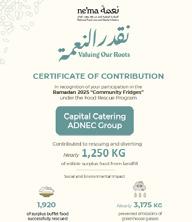
ADNEC Tourism’s Desert Camp goes beyond a traditional visitor experience, serving as a powerful platform for heritage preservation and community empowerment. Spanning over 8,000 square metres in the UAE desert, the camp offers an authentic and immersive exploration of Emirati traditions and Bedouin culture, curated closely with local families.
Uniquely, Emiratis themselves lead the storytelling, sharing values, resilience, and stories passed down through generations. Whether guiding guests through camel rides and falconry, preparing traditional meals, or recounting historical tales, these community members act as proud heritage ambassadors, deriving meaningful livelihoods from their cultural knowledge and craftsmanship.
Reflecting ADNEC Group’s environmental commitments, the Desert Camp operates on solar energy and provides a fully digitised, paperless visitor experience to minimise its ecological footprint.
By directly involving local Emiratis as guides, artisans, and storytellers, the Desert Camp not only preserves history and traditional skills but transforms them into sustainable economic opportunities, ensuring the cultural legacy continues to thrive and be shared authentically.
ADNEC Group plays a pivotal role in driving Abu Dhabi’s and the broader UAE’s economic development by directly contributing to strategic sectors such as tourism, healthcare, education, agriculture, and energy. By attracting diverse international audiences, including event organisers, exhibitors, trade professionals, and corporate and association delegates, ADNEC generates significant business activity and sector-specific growth.
The Group assesses its economic impact across three dimensions:
• Direct Impact: Core event and venue operations.
• Indirect Impact: Spending throughout the broader supply chain.
• Induced Impact: Increased household spending arising from employment supported by ADNEC-related activities.
In 2024, ADNEC Group achieved its highest-ever economic contribution, generating AED 8.57 billion in Gross Value Added (GVA) and supporting over 62,100 jobs within the UAE. These achievements reflect ADNEC’s expanding role as a catalyst for economic growth, job creation, and Abu Dhabi’s emergence as a global hub for business tourism, knowledge exchange, and strategic events.
In 2024, Capital Events successfully delivered a diverse portfolio of high-impact exhibitions and forums, combining commercial excellence with meaningful environmental and social outcomes. Sustainability was integrated across event operations, demonstrated through initiatives such as powering the Abu Dhabi International Boat Show with clean energy, and promoting local sourcing and food security at ADIFE and Global Food Week
The Abu Dhabi International Hunting and Equestrian Exhibition (ADIHEX) 2024 preserved and promoted cultural heritage through immersive workshops and wildlife education, while events like Bitcoin MENA and ISNR 2024 advanced critical conversations around fintech equity, cybersecurity, and public safety. Innovation-driven platforms such as UMEX & SimTEX highlighted developments in artificial intelligence and robotics, actively engaging youth and startup communities
Across all events, key ESG practices included the adoption of plant-based alternatives to singleuse plastics, fully digitalised visitor experiences, proactive inclusion of SMEs, and strategic collaboration with social enterprises, ensuring strong alignment between ADNEC Group’s event strategy, national sustainability objectives, and community empowerment.
In 2024, Excel London significantly expanded its community engagement and social impact initiatives, deepening support for Newham’s local community through meaningful charity partnerships, educational programmes, volunteering, accessibility enhancements, and global sustainability leadership. Excel’s commitment reflects a strategic approach to driving positive change both locally and internationally.
Excel maintains long-term partnerships with multiple Newham-based charities, providing financial support, in-kind contributions, and staff volunteering. Key partners include:
• Bonny Downs Community Association: Food bank services.
• Community Food Enterprise: Addressing food poverty.
• Newham All Star Sports Academy: Youth sports outreach.
• Richard House Children’s Hospice
• Inspire: Educational initiatives.
• Custom House Community Bookshop
• Every Child Online: Tackling digital exclusion.
Excel also regularly donates surplus food and event items to local charities, further supporting vulnerable community members.
Excel London regularly hosts free community events and educational programmes aimed at benefiting local residents. In 2024 alone, the venue opened its facilities to host 10 social-value events attended by over 4,000 local participants, covering diverse topics from financial literacy to STEM education. Notable events included the Moneywise Challenge, teaching budgeting skills to primary school pupils, and the STEM in Aviation Day, organised in partnership with London City Airport, which introduced hundreds of East London students to science and technology careers in aviation. Excel also collaborates closely with Newham Council to ensure residents have access to learning, networking, and employment opportunities through the venue’s exhibitions and conferences.
Excel actively encourages its employees and event partners to participate in volunteering projects, demonstrating a strong commitment to community support. In 2024, Excel partnered with the Formula E racing series to hold a dedicated volunteer day at Richard House Children’s Hospice, a local organisation supporting over 300 families. Volunteers from Excel and Formula E spent the day refurbishing and painting hospice facilities and revitalising its Memorial Garden, enhancing the environment for patients and families. Additionally, Excel’s employees and catering partner regularly support charitable events such as the annual “One Day at Christmas” charity lunch, helping serve festive meals and providing companionship to hundreds of isolated elderly London residents.
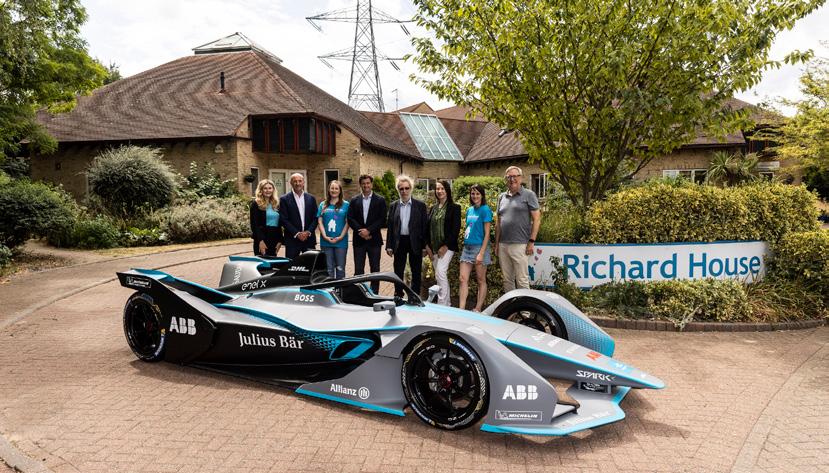
Ensuring an inclusive and welcoming environment has been a priority. Excel London implemented the Hidden Disabilities Sunflower scheme, a global initiative to discreetly identify visitors with non-visible disabilities and made training on this scheme available to all employees (with mandatory training for all public-facing staff). This allows staff to better support guests who may need extra assistance. In addition, Excel convened a new Accessibility Governance Forum and a Disability Taskforce to develop a comprehensive Accessibility Strategy and Policy, which launched in late 2024, aiming to achieve the highest standards of venue accessibility going forward. Within its own workforce, Excel also promotes social inclusion and fairness. It is a certified London Living Wage employer (since 2022) and requires all its contractors to pay the Living Wage as well, improving pay equity for employees and subcontractors in its supply chain.
In 2024, Excel London launched the IMPACT Programme toolkit, developed in collaboration with the non-profit organisation #Meet4Impact. This toolkit provides event organisers with practical guidance on designing and implementing meaningful social legacy projects, including stakeholder engagement, strategic planning, and outcome measurement. By utilising this resource, exhibitions and conferences at Excel London can deliver lasting and tangible benefits to the local community.
BDC’s strong people-centric culture is evidenced by its high B Corp Workers score of 26.1 points and extensive initiatives supporting employee well-being, professional growth, and workplace inclusion. In 2024, BDC further strengthened employee wellness by expanding benefits and introducing new HR policies to prioritise staff mental and physical health.
Employees at BDC benefit from comprehensive wellness offerings including:
• Free weekly yoga classes
• Quarterly chair massages
• Biannual sound-bath meditation sessions
• Fresh fruit provided daily in offices
• Subscriptions to mindfulness apps (Calm/Headspace)
These wellness initiatives complement a robust benefits package offering:
• Private healthcare coverage
• Health cash plans
• Cycle-to-work and travel loan schemes
• Free eye tests and flu vaccinations
• Housing deposit loan programme
In 2024, BDC introduced a Menopause Policy and improved provisions for flexible working, carers’ leave, and paternity leave to better accommodate diverse employee needs.
BDC emphasises continuous professional growth through tailored training programmes and structured personal development goals across all departments. Regular all-staff meetings, such as company breakfasts at local cafés, alongside various social events, foster cross-team camaraderie and engagement. Internal survey results reflect strong alignment with BDC’s core values, with 91% of employees agreeing the company actively prioritises environmental sustainability.
BDC firmly commits to fostering workplace diversity, equity, and inclusion. Key DEI initiatives in 2024 included:
• Achieving Disability Confident Committed Employer (Level 1) certification, demonstrating proactive recruitment, retention, and development of employees with disabilities.
• Creating inclusive permanent facilities such as an on-site quiet/prayer room.
• Regularly celebrating cultural events including Diwali, Eid, Pride, and Black History Month.
• Empowering employee-led DEI working groups to drive meaningful initiatives.
BDC’s inclusive culture received external recognition in 2023 when a BDC team member was named a finalist for a national Diversity Champion award, highlighting the venue’s commitment to inclusion.
BDC’s workplace ethos consistently empowers employees by promoting autonomy, adaptability, and mutual support, ensuring its team remains its greatest asset in delivering sustainable, innovative events.
BDC demonstrates a strong commitment to community engagement, earning a notable B Corp Community score of 13.5. Its approach focuses on delivering meaningful local economic impacts, charitable contributions, volunteerism, and civic involvement.
In 2023, BDC donated over £140,000 to various community initiatives, funding youth arts education, anti-violence workshops, and mental health programmes to address critical local needs. Additionally, BDC provides extensive in-kind support, including free venue space, publicity, and staff resources for charitable activities. For instance, the annual "One Day at Christmas" event hosted at BDC provides hundreds of elderly or isolated residents with a festive meal and celebration.
BDC staff actively engage in volunteer efforts, partnering with local organisations to deliver impactful community programmes:
• Collaborated with the Local Village Network in a five-week student mentoring initiative at a local school, concluding with networking practice at BDC.
• Participated in numerous fundraising events, including a company-wide Twilight Walk in 2023 that raised over £8,200 for The Brain Tumour Charity, a cause significant to BDC’s leadership.
• Organised charity quiz nights involving tenant companies and contributed resources to the Islington Giving winter appeal, helping raise over £18,000 for local community groups.
Beyond direct philanthropy, BDC actively supports local economic growth by prioritising ethical and local sourcing in its procurement practices. It engages local suppliers, small businesses, and social enterprises, actively encouraging clients and tenant companies to participate in initiatives such as the Donate Not Waste programme.
As a member of the Angel Islington Business Improvement District and its Responsible Business Network, BDC collaborates with local enterprises pursuing community improvements and shared net-zero ambitions. BDC’s longstanding approach integrates financial support, volunteerism, in-kind aid, and strategic local partnerships, firmly establishing its reputation as a committed, community-centric business.
ADNEC Group maintains a robust governance framework built upon the highest standards of ethical conduct, risk management, and transparency, ensuring accountability and sustained value creation for stakeholders. Clear governance structures oversee ESG strategy, compliance, risk management, data protection, and internal control processes.
Sustainability Reporting and Disclosure:
ADNEC Group publishes an annual ESG report aligned with the Global Reporting Initiative (GRI) Standards. All sustainability data is rigorously reviewed and verified internally, supported by clear audit trails for key metrics. Currently, ESG data is publicly accessible via ADNEC Group’s digital platforms. Beginning in 2025, ESG reports will undergo external assurance by a certified third-party provider, enhancing transparency and credibility.
Sustainability Strategy and Framework:
ADNEC Group's ESG strategy sets out the Group’s long-term vision and material issues, supported by defined governance mechanisms and an integrated Net Zero roadmap. From 2025 onward, all ESG reports will be externally assured by a certified third-party assurance provider.
ADNEC Group is firmly committed to preventing corruption, embedding integrity and ethical standards deeply within its operational practices. Key anti-corruption measures include:
• Zero-Tolerance Policy
Clearly articulated through the Fraud Control Policy and Ethics and Anti-Corruption Policy, demonstrating the company’s uncompromising stance against fraudulent or corrupt activities.
• Enhanced Policy Framework
Recently updated using insights from international best practices such as ISO/AWI 37003, a globally recognised standard for fraud control management.
• Comprehensive Code of Conduct and Business Ethics
Supported by dedicated policies on Anti-Bribery & Corruption, Conflict of Interest, and Whistleblowing, ensuring all business activities meet high ethical standards.
• Mandatory Staff Compliance
Annually, employees formally acknowledge their understanding and adherence to the Code of Conduct and related governance policies via declaration forms. New employees confirm compliance upon onboarding, supported by regular training and refresher sessions.
ADNEC clearly defines corruption as any dishonest or abusive action for personal gain, including bribery, inappropriate gifting, illicit gratuities, hidden transactions, economic extortion, and undisclosed conflicts of interest. The universal staff certification of these principles’ underscores ADNEC Group’s unwavering commitment to integrity, accountability, and ethical governance across all levels of the organisation.
Anti-Corruption Practices
ADNEC Group employs robust measures to prevent corruption and uphold integrity across all operations. Key practices include:
• Risk Analysis and Disclosure
Regular reporting and disclosure on the percentage of business units analysed for corruption-related risks.
• Mandatory Compliance Sign-off
Annual signing of the Code of Conduct and Conflict of Interest declaration by all employees, reaffirming their commitment to ethical standards.
• Awareness and Training
Human Capital, in collaboration with an independent Audit and Governance team, conducts annual training and induction sessions on Anti-Bribery and Corruption Policies, Conflict of Interest management, and Whistleblowing procedures. Year
Anti-Corruption, Anti-Money Laundering, and Combating the Financing of
Compliance Reporting
ADNEC Group promotes an internal "Speak Up" culture, encouraging employees and stakeholders to openly raise concerns regarding potential violations of the Code of Conduct or clarify its practical application. Internal Audit regularly assesses compliance adherence and conducts systematic reviews to ensure effective implementation.
Whistleblowing
ADNEC maintains an independent whistleblowing system managed by a confidential external third party. Employees and stakeholders can securely report concerns, which are then confidentially shared with the Head of Internal Audit and the Chief Human Capital Officer. Concerns are addressed following a clearly defined compliance charter, with complex issues overseen by a dedicated investigation committee comprising representatives from Internal Audit, Human Capital, and Legal Affairs as required.
ADNEC Group’s Fraud Control Policy provides employees and stakeholders with clear and comprehensive guidelines designed to mitigate fraud risks across the organisation. The policy enforces a strict zero-tolerance stance on fraud and ensures swift and effective action in addressing any instances of misconduct. Employees are required to formally affirm their compliance annually through a mandatory declaration. Recently, ADNEC updated this policy by incorporating insights from international best practices, notably the ISO/ AWI 37003 standard, recognised globally for its robust guidance on organisational fraud control management.
ADNEC Group maintains a robust Code of Conduct and Business Ethics, reviewed and updated annually to ensure alignment with best practices. This comprehensive framework reinforces ADNEC’s commitment to maintaining the highest ethical standards across all business activities, both within the UAE and internationally.
ADNEC Group strictly adheres to a clear and structured policy against anti-competitive practices, reinforced by robust reporting and disclosure mechanisms highlighted within its ESG report. This commitment is further supported by the Group’s comprehensive Code of Conduct, ensuring fair competition and ethical conduct across all business activities.
ADNEC Group proactively prevents anti-competitive behaviour through a comprehensive framework comprising clear policies, employee training, secure reporting channels, and regular compliance reviews. Key practices include:
• Clearly Defined Policies:
ADNEC maintains an explicit Anti-Competitive Policy, supported by comprehensive policies on Anti-Bribery & Corruption, Conflict of Interest and Related Party Transactions, and Whistle-blowing, all underpinned by its Code of Conduct and Business Ethics.
• Employment Contract Clauses
All employee contracts include a specific clause prohibiting anti-competitive conduct, ensuring clear legal accountability.
• Independent Whistleblowing Mechanism
Established in 2009 and independently managed since 2014, ADNEC provides a confidential, third-party whistleblowing service for employees to securely report concerns or policy violations. There have been no legal actions related to anticompetitive behaviour in recent years.
• Policy Communication and Training
Employees receive email notifications regarding updated policies, which are accessible on the company intranet. Regular Policy Awareness Workshops, typically held once or twice annually by the Human Capital Department, provide opportunities for staff to clarify doubts and enhance understanding.
• Specialised Anti-Competitive Behaviour Training
Dedicated training sessions on anti-competitive practices and anti-corruption are conducted by the Human Capital Department.
• Employee Onboarding and Annual Declarations
All new hires sign a formal declaration acknowledging their understanding and compliance with ADNEC’s anti-competitive policies. This is reinforced through structured induction sessions and annual refresher training.
• Contractual Integration
The Code of Conduct and Business Ethics forms an official addendum to each employee’s employment contract, reinforcing both legal significance and organisational commitment to ethical practices.
of Workforce Formally Certified and Compliant with the Anti-Competitive / Conflict of Interest Policy (%)
ADNEC Group provides secure, confidential, and easily accessible channels for employees to report suspected violations of the Code of Conduct or other ethical concerns. Employees can utilise several internal reporting options, including:
• Direct Line Manager
• Departmental Director
• Compliance Representatives:
o Head of Employee Relations
o Ethics Officer (Internal Audit Department)
o Head of Compliance and Risk
o Legal Counsel
If an employee feels uncomfortable using internal channels or is unsatisfied with the resolution, they may escalate concerns through ADNEC Group’s independent, confidential, and anonymous whistleblowing platform, available 24/7:
• Toll-free Hotline (UAE): 800 0320995
• Online Reporting Portal: Accessible via ADNEC’s internal portal “MyWeb”
Both external reporting channels are managed independently by NAVEX, a reputable thirdparty risk and compliance management platform. All submitted reports are simultaneously forwarded to both the Ethics Officer (Internal Audit) and the Head of Employee Relations, ensuring confidential, timely, and impartial handling.
To foster understanding, confidence, and a speak-up culture, the Human Resources Department regularly conducts awareness sessions and training workshops. These sessions clarify policies, explain reporting mechanisms, and reinforce the integrity and confidentiality of the reporting processes. The department also oversees the implementation and continuous management of these policies.
ADNEC Group is firmly dedicated to safeguarding human rights throughout its operations and across its supply chain. Aligned with the human rights guarantees enshrined in the UAE Constitution and regulations by the Ministry of Human Resources and Emiratisation (MOHRE), the Group maintains comprehensive policies and procedures that comply with international frameworks, including International Human Rights Law (OHCHR)
These human rights commitments are integrated into the Group’s Code of Conduct, and reinforced through biannual employee training workshops, ensuring staff remain informed about their rights, responsibilities, and updates in legislation.
Employees are encouraged to promptly report any perceived violations via ADNEC’s confidential and independent whistleblowing platform, accessible 24/7, ensuring all concerns are handled confidentially, ethically, and thoroughly investigated.
ADNEC Group’s commitment also extends to its supply chain. All suppliers must adhere strictly to applicable human rights laws and MOHRE policies, with compliance requirements explicitly incorporated into the Group’s procurement processes, as outlined elsewhere in this report. Year
ADNEC Group takes its responsibility to uphold human rights and safeguard employee welfare throughout its supply chain with utmost seriousness. This commitment is explicitly reinforced during procurement processes, particularly for contracts where manpower provision is central. ADNEC clearly sets out human rights expectations within every contract’s Scope of Work, holding suppliers accountable from the outset.
ADNEC performs detailed due diligence and regular monitoring to ensure suppliers comply with essential standards, particularly in the following areas:
1. Provision of Food
• Suppliers must provide three balanced and nutritious meals daily for all staff, addressing dietary needs to promote health, productivity, and overall well-being.
2. Accommodation Standards
Accommodation provided by suppliers must meet the following standards:
• Clean, hygienic, and safe facilities.
• Cooking facilities for staff use.
• Laundry facilities for personal hygiene.
• Adequate washroom facilities (toilets, showers, and clean water access).
• Recreational areas, including common rooms and outdoor spaces, to support mental and physical well-being.
• Proximity to the workplace, ensuring manageable commuting distances to reduce fatigue and stress.
• Safe and reliable transportation provided to and from work locations, with vehicles equipped with essential safety features (seatbelts, fire extinguishers).
3. Compensation and Employee Benefits
• Full compliance with UAE minimum wage laws without exception.
• Promotion of equal pay for equal work, ensuring pay parity regardless of gender or role.
• Fair compensation practices that reward employees according to experience and responsibility.
• Medical insurance provided to all employees, ensuring comprehensive healthcare coverage.
• Entitlement to leave travel benefits, including a paid return flight to the employee's home country every 24 months to support family connectivity and long-term well-being.
4. Uniforms and Personal Protective Equipment (PPE)
• Provision of at least three complete uniforms per worker, including suitable safety shoes for daily use.
• Role-specific PPE provided as required (e.g., catering, cleaning, security, traffic management) to ensure worker safety.
Supplier adherence is actively monitored through:
• Pre-contract assessments to validate supplier capabilities and commitments.
• Regular spot checks and unannounced audits during the initial contract period.
• Direct interviews with supplier employees to verify timely salary payments, appropriate working conditions, and the delivery of agreed benefits.
• Enforcement of corrective actions and provision of supplier support in cases of identified non-compliance.
Training is a critical pillar of ADNEC Group’s commitment to upholding human rights and ensuring the dignity and preparedness of all personnel. This includes:
• Mandatory Health and Safety Training: All food handlers working under Capital Catering are required to hold a valid Essential Food Safety Training (EFST) Certificate, issued by the Abu Dhabi Municipality. This is a non-negotiable requirement for anyone handling food, ensuring both compliance and public safety.
• Workforce Readiness: Many outsourced personnel, such as security guards, traffic marshals, cleaners, and catering staff, engage with ADNEC venue visitors more frequently than permanent staff. ADNEC Group places strong emphasis on ensuring these individuals are well-prepared, professional, and equipped to represent the organisation confidently and respectfully.
• Mandatory Work at Height Training: All personnel involved in work at height or operating Mobile Elevated Work Platforms (MEWPs) must hold valid IPAF certification and have completed Work at Height training.
• Permit to Work Requirement: All work activities conducted at ADNEC premises must be authorised through a Permit to Work (PTW) system, which is managed and controlled jointly by the Facilities Management, Health and Safety, and Security teams.
Where training gaps are identified, the Group takes immediate steps to address them. This may include:
• Formal discussions with suppliers to improve onboarding or refresher training processes
• On-the-job briefings conducted by ADNEC Group teams to equip staff with the information and awareness needed to fulfil their responsibilities effectively
ESG-Aligned Governance
Excel London operates under a clear, robust governance structure aligned with ADNEC Group’s corporate governance standards and international ESG frameworks. Executive leadership at ExCeL ensures sustainability targets and ethical considerations are embedded across business decisions. An internal ESG Committee oversees implementation, regularly reporting progress into ADNEC Group’s ESG governance system.
Excel maintains comprehensive policies covering ethics, anti-corruption, diversity and inclusion, health and safety, and data protection. The venue transparently discloses its ESG progress annually and engages proactively with stakeholders through accessible reporting. Regular external audits through ISO certifications (ISO 14001, ISO 20121, ISO 27001) provide independent validation, reinforcing trust among clients and partners.
Excel London actively engages its local community through initiatives addressing diversity, economic development, and inclusion. The venue’s Accessibility Governance Forum, co-led by senior management, drives enhancements to inclusivity and accessibility, ensuring it remains responsive and accountable to diverse stakeholder needs.
Excel London is committed to global ESG standards as a participant in the United Nations Global Compact (UNGC) and aligns its sustainability initiatives with the UN Sustainable Development Goals (SDGs). The venue’s Carbon Neutral certification (PAS 2060) further underscores its commitment to measurable sustainability action and ongoing transparency.
In August 2023, BDC achieved Certified B Corporation status, legally embedding ESG commitments within its corporate governance framework and formally prioritising people, planet, and profit. This certification validates BDC’s robust sustainability practices, reflected in an impressive overall B Impact Score of 81.6, significantly exceeding industry averages. Regular recertification every three years ensures BDC maintains continuous improvement, accountability, and alignment with global ESG standards.
Under ADNEC Group’s governance framework, BDC operates comprehensive ethics and compliance systems, including clear policies covering:
• Anti-corruption and fair business practices
• Data protection and cybersecurity
• Health and safety standards
Regular ethics and environmental training ensures that compliance and ethical principles are deeply embedded at every organisational level.
BDC demonstrates transparency and accountability through publication of an annual Impact Report , detailing key ESG metrics, progress toward net-zero targets, and community contributions.
To ensure inclusive governance, BDC engages stakeholders through dedicated internal committees focused on sustainability, governance, and employee well-being initiatives. The organisation aligns closely with the UN Sustainable Development Goals (SDGs) and internationally recognised ESG frameworks, reinforcing a comprehensive and holistic sustainability approach.
Within the ADNEC Group, BDC serves as a governance exemplar, effectively illustrating how ESG integration can enhance corporate strategy and significantly contribute to the Group’s overall sustainability performance.
ADNEC Group maintains a fully independent Internal Audit function that significantly enhances organisational performance, accountability, and transparency. The Internal Audit team provides objective assurance and advisory services, ensuring robust governance, risk management, and effective internal controls throughout the organisation.
• The Internal Audit function follows an annual audit plan and a comprehensive three-year internal audit strategy, both closely aligned with organisational priorities and risk assessments.
• Regular assessments of ADNEC Group’s policies, procedures, and operational effectiveness are conducted, with results reported directly to the Board-level Audit Committee.
The Audit Committee consists of three qualified members to ensure robust oversight and impartiality:
• One independent, non-executive director
• Two fully independent external members, unaffiliated with ADNEC Group
This structure guarantees independent, rigorous oversight of audit findings, risk management, and governance processes.
ADNEC Group actively aligns its corporate governance practices with internationally recognised frameworks, including:
• UK Combined Code of Conduct
• OECD Principles of Corporate Governance
Regular benchmarking against these global standards guides continuous review, refinement, and improvement of the Group’s internal controls and governance mechanisms.
These commitments are formalised within the annually reviewed Corporate Governance Approach, which remains responsive to evolving standards and best practices, ensuring sustained governance excellence and continuous organisational improvement. Year
2-23 2-29
*Key Governance Documents: (DOA, Governance Approach, Risk Management Approach, Code of Conduct, Whistle Blowing Policy, Fraud Control Policy, Business Continuity Approach, Project Management Approach, etc)
Enterprise Risk Management (ERM)
ADNEC Group’s ERM framework aligns with the ISO 31000 standard, providing a structured and systematic approach to identifying, assessing, and managing key business risks. Risk awareness is embedded throughout the organisation at all levels.
Key Features:
• Routine departmental risk assessment workshops proactively identifying compliance, operational, reputational, and strategic risks.
• Regular control effectiveness evaluations conducted alongside Internal Audit.
• Integration of ERM findings into governance processes, annual planning, and performance reviews.
Below is a summary of planned and/or undertake reviews at least once as part of the three-year cycle:
Audits and Follow Ups
Health & Safety
Facilities Management
Environment & Cleaning
Security
Food Safety
Business Continuity
Purpose and Scope Brief Standards Utilized
Assessment of compliance with applicable health and safety regulations, including OSHAD and Civil Defense requirements.
Evaluation of building infrastructure, including mechanical, electrical, HVAC systems, fire, and life safety checks.
Review of compliance with environmental regulations, ISO standards, and hazardous material handling protocols.
Audit of compliance with MCC laws and specifications for monitoring and control devices, including x-ray and scanning equipment.
Assessment of compliance with food safety and hygiene standards in catering and venue operations.
The NCEMA Business Continuity standard ensures organisations in the UAE are prepared to effectively respond to and recover from disruptions, enhancing resilience, safety, and continuity of critical operations.
Abu Dhabi Occupational Safety and Health System Framework (OSHAD-SF)
UAE Fire and Life Safety Code of Practice (2018)
AD-EHSMS Decree No. 42 and ISO 14000
Abu Dhabi MCC Law No. 5 of 2011 and Federal Law by Decree No. 6 of 2009 (Peaceful Uses of Nuclear Energy)
Abu Dhabi Emirate Food Law No. 2008/2 (expanded)
NCEMA 7000:2021 Standard
ADNEC Group maintains a robust Business Resilience framework, enabling swift and effective responses to operational disruptions and safeguarding organisational continuity and stakeholder trust.
Governance Structure
• Chief Operations Officer (COO): Top management representative for the Business Continuity Management System (BCMS).
• Director of Digital & Technology: Top management representative for the Information Security Management System (ISMS).
• Dedicated Business Continuity and Information Security Managers coordinate resilience activities with departmental Resilience Champions.
• Regular reports on progress, incidents, and performance metrics delivered to Executive Management, with annual formal management reviews.
• Both BCMS and ISMS are integrated into the ERM framework for consistent risk identification, assessment, treatment, and ownership.
• Risk treatment plans integrated into departmental work programmes and actively managed by Resilience Champions.
ADNEC’s Business Continuity Plans (BCPs), developed at departmental and organisational levels, fully comply with NCEMA 7000:2021, the UAE’s national standard. These plans ensure uninterrupted service delivery across scenarios including IT outages, infrastructure failures, safety incidents, public health emergencies, and natural disasters.
• An established network of Continuity Champions throughout the organisation.
• Regular training and awareness sessions equip staff to proactively identify, respond to, and report potential risks and incidents.
• Systematic identification and investigation of incidents via reporting, audits, and controls.
• Root cause analyses followed by corrective and preventive actions.
• A structured continual improvement process tracking and reviewing all improvement actions. Year
ADNEC Group prioritises data security, privacy protection, and digital infrastructure resilience, adhering to global best practices and robust regulatory compliance standards.
• ISO/IEC 27001 (ISMS): Certification confirming ADNEC’s adherence to global data protection and cybersecurity standards.
• ISO/IEC 20000-1 (IT Service Management): Ensuring structured and secure IT service delivery, reinforcing reliability and data integrity.
ADNEC complies fully with UAE and international data protection regulations, governed by clearly defined internal policies including:
• Information Governance Policy
• Information Security Policy
• Privacy Policy
Privacy
ADNEC implements proactive security measures including:
• Annual Vulnerability Assessment and Penetration Testing (VAPT).
• A 24/7 Security Operations Centre (SOC) managed by an external cybersecurity expert partner.
• Continuous evaluations and audits conducted internally by ADNEC’s Cybersecurity team.
The Digital Transformation department, in partnership with Compliance and Risk teams, delivers regular cybersecurity awareness sessions covering topics like phishing, safe online practices, and incident response.
Annual external cybersecurity assessments benchmarked against:
• UAE Information Assurance (IA) Standards
• Centre for Internet Security (CIS) Critical Controls
Results from these assessments drive continuous enhancements to ADNEC’s cybersecurity infrastructure and governance.
Through this comprehensive approach, ADNEC Group ensures robust data protection, operational resilience, regulatory compliance, and sustained stakeholder confidence, reinforcing the organisation’s leadership in secure and responsible digital operations.
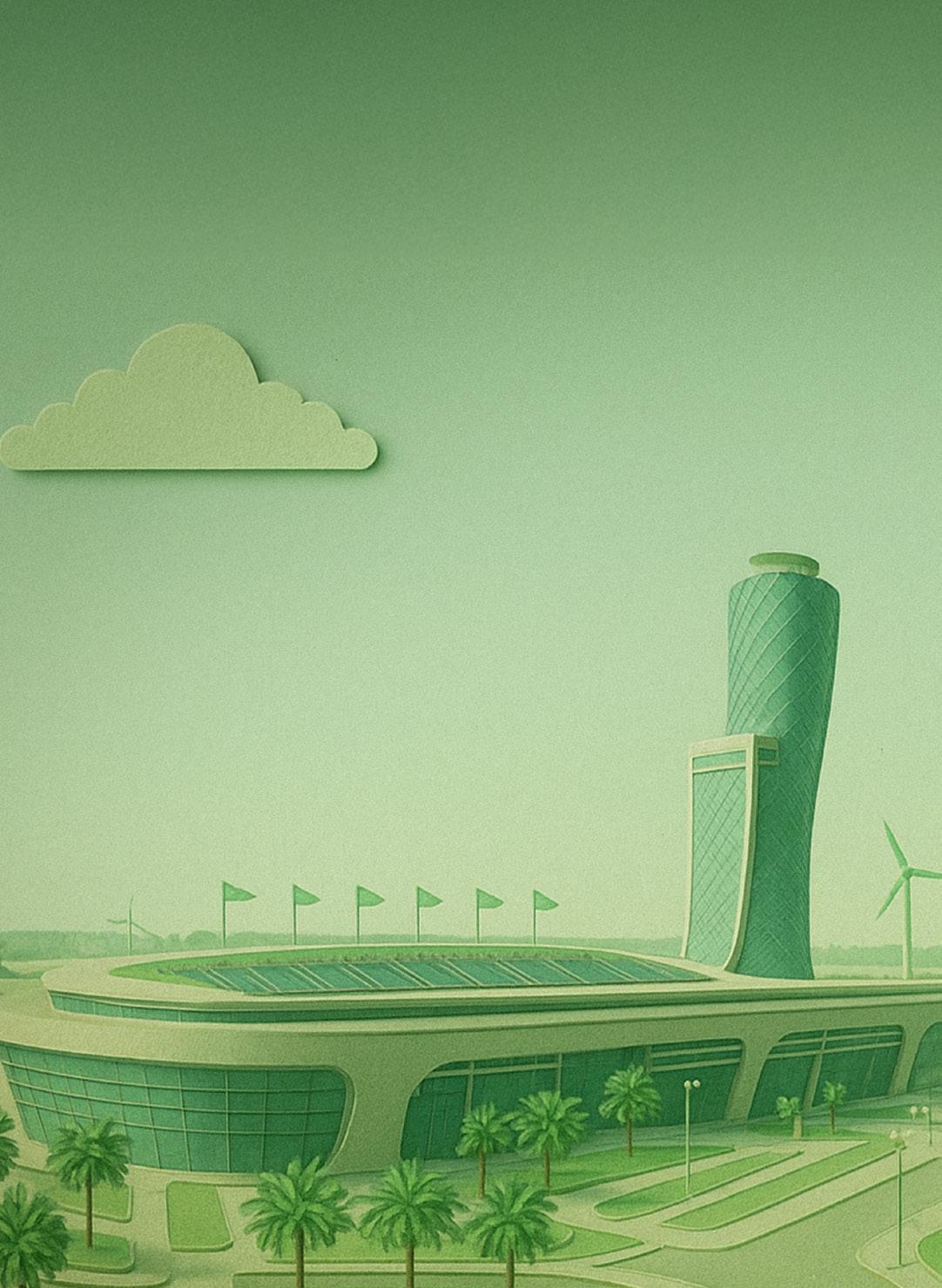

GRI 2-1 Organizational details Section 3 – About ADNEC Group Legal form, location, ownership
GRI 2-2 Entities included in sustainability reporting
GRI 2-3 Reporting period, frequency, contact point
1 – About this Report Lists all ADNEC Group entities included
Covers period: Jan–Dec 2024; contact details provided
GRI 2-4 Restatements of information Section 1 – Restatements of Information Changes to baselines and KPIs explained
GRI 2-5 External assurance
GRI 2-6 Activities, value chain, relationships
Stated that 2025 onward reports will be assured
3 – About ADNEC Group Describes core business clusters and value chain
GRI 2-9 Governance structure and composition Section 8 – Governance and Control Governance under Modon Holding outlined
GRI 2-10 Nomination and selection of highest governance body Governance & Control (paragraph)
GRI 2-12
Board nomination and appointment noted under UAE law
GRI 2-13 Delegation of responsibility Section 8 – Roles & Responsibilities Day-to-day ESG led by Strategy & Sustainability Dept
GRI 2-14 Role of highest governance body in reporting Governance and Control
GRI 2-16 Communication of critical concerns Whistleblowing Section
GRI 2-17 Knowledge of highest governance body ESG Awareness and Training
CEO accountable for ESG performance and reporting
Anonymous channels and escalation to leadership
Executive ESG training described
GRI 2-22 Statement on sustainable development strategy MD Statement; Strategy Section Long-term vision and Net Zero targets
GRI 2-23 Policy commitments Section 7 – ESG Policy
GRI 2-24 Embedding policy commitments ESG Strategy Map & ESG Policy
GRI 2-26 Raising concerns
GRI 2-28 Memberships and initiatives
GRI 2-29 Stakeholder engagement
Whistleblowing Section
Section – National and International Mandates
ESG principles integrated across the Group
Supplier code of conduct, staff declarations, training
24/7 confidential reporting via NAVEX
Lists UNGC, NZCE, SBTi, SDGs, EFQM, etc.
Materiality Section; Stakeholder Wheel Stakeholder mapping and engagement methodology
GRI 3-1 Process to determine material topics Materiality Assessment
GRI 3-2 List of material topics Materiality Matrix
Methodology with 3 weighted dimensions
Full list and most material topics provided
GRI 3-3 Management of material topics ESG Strategy Map; ESG Policy Goals, implementation actions, KPIs
GRI 203-1 Infrastructure investments and services supported
GRI
GRI 204-1 Proportion of spending on local suppliers
Impact GVA contribution and sectors impacted
Procurement metrics with localisation
GRI
We welcome your feedback on our sustainability approach and performance. For further details about any of the information you find within this report, please contact ADNEC’s sustainability team:
ADNEC Group
Khaleej Al Arabi Street
P.O. Box 5546, Abu Dhabi, United Arab Emirates
Tel: +971 (0) 2 444 6900
Email: sustainability@adnec.ae

Get the Digital ESG Report